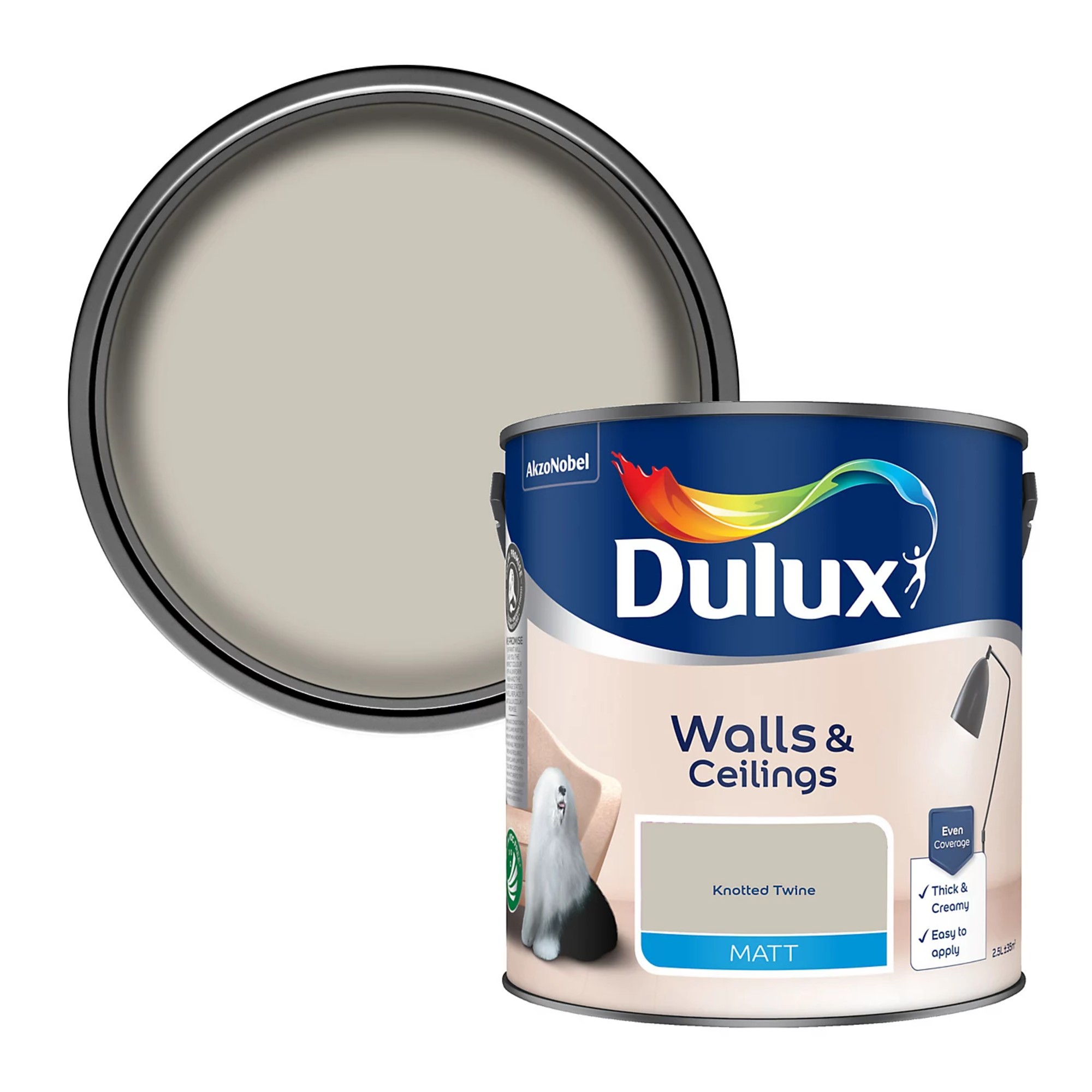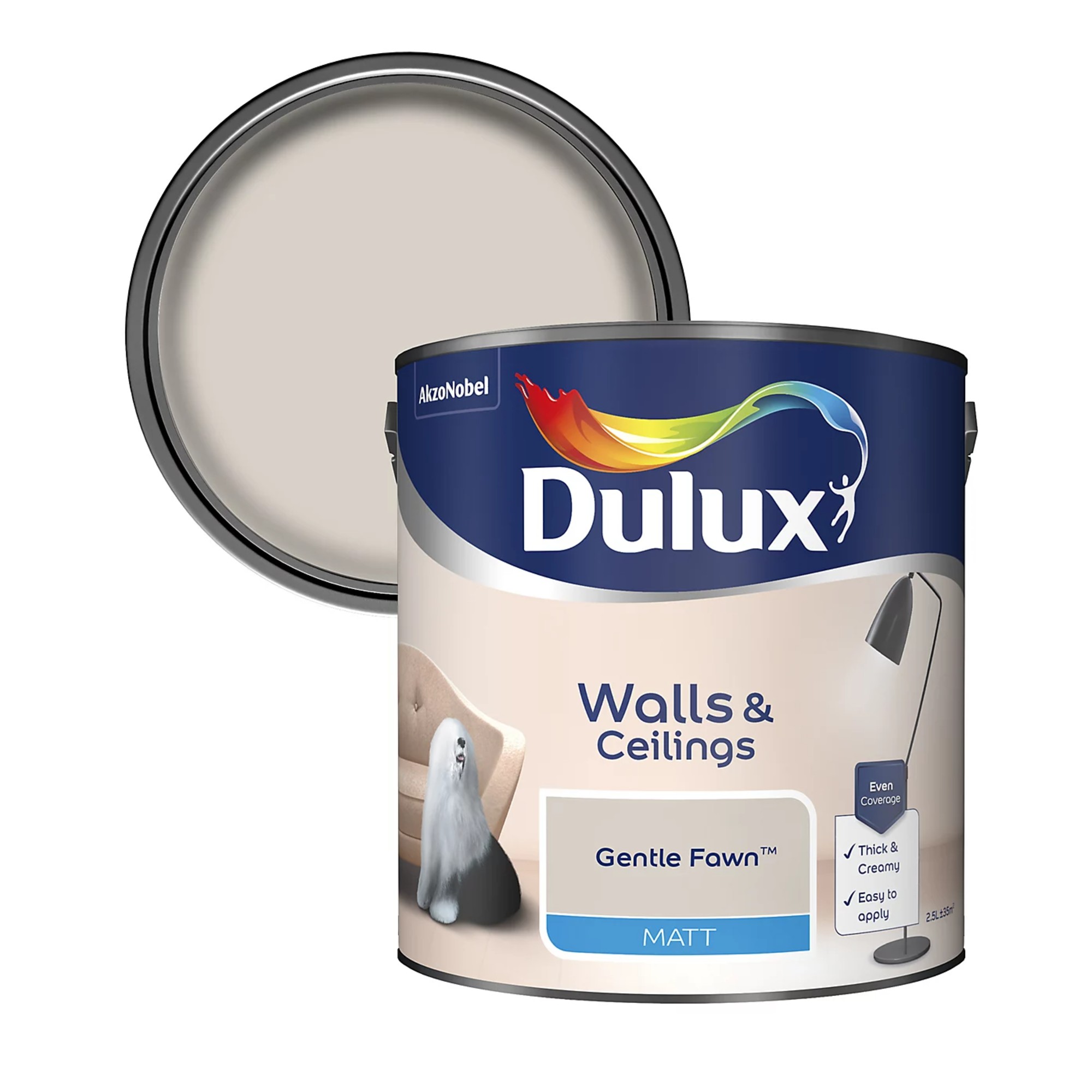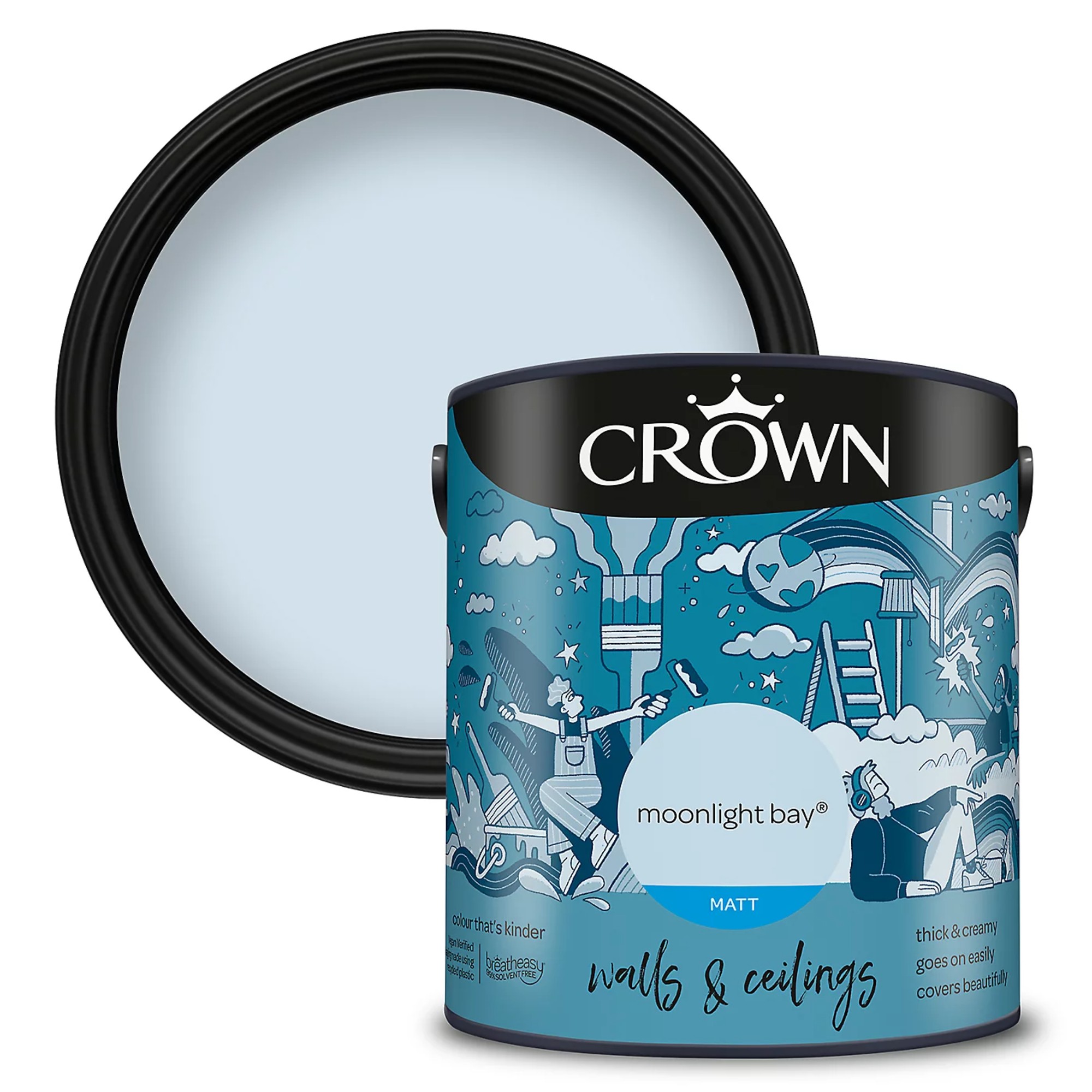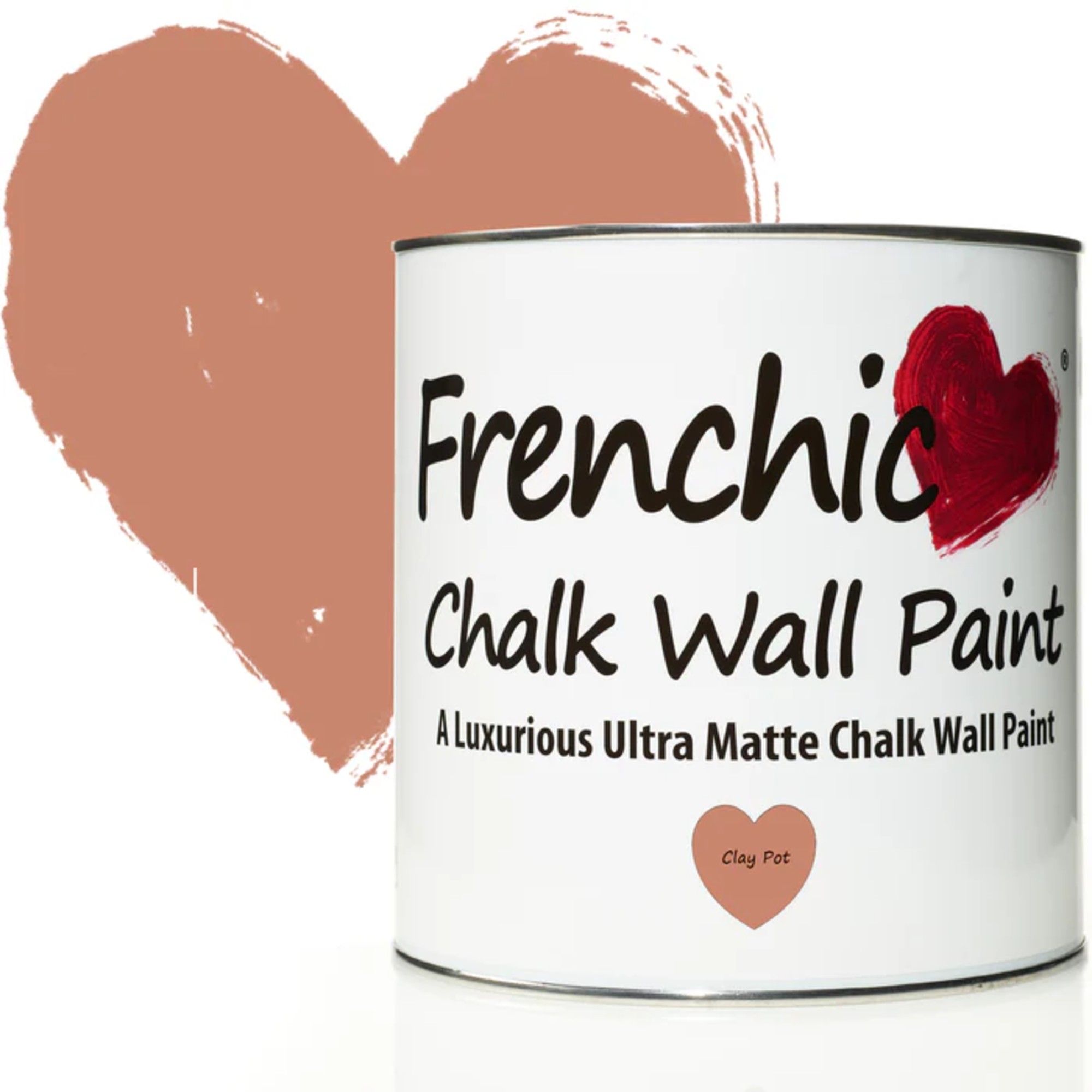31 bedroom paint ideas to easily transform your space with unexpected paint techniques and shades
If you want to give your bedroom an easy makeover, all you need is paint and these clever ideas
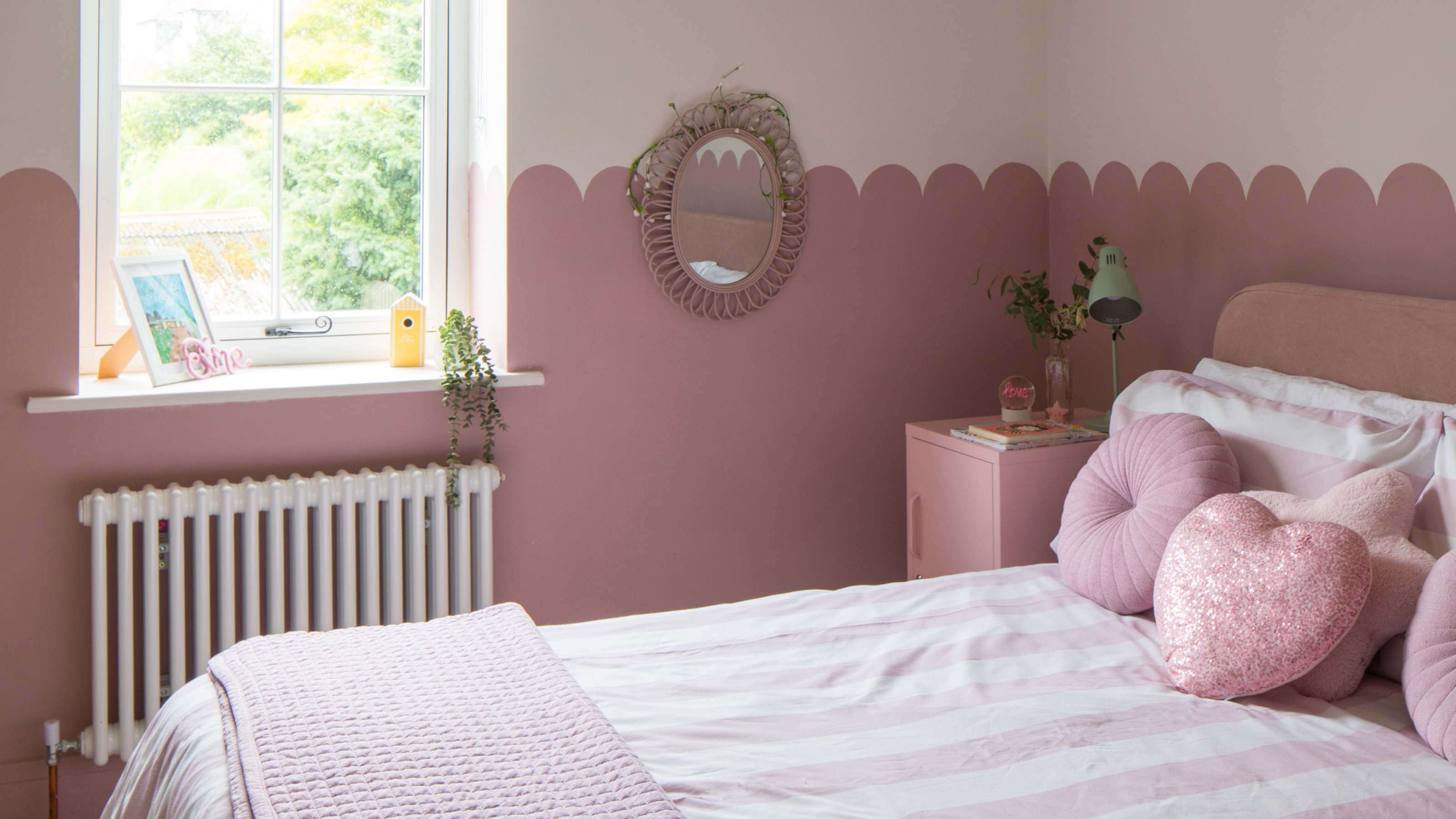
Sign up to our newsletter for style inspiration, real homes, project and garden advice and shopping know-how
You are now subscribed
Your newsletter sign-up was successful
Paint is one of the easiest and most effective ways to transform your space – and the bedroom is no exception. Whether you’re looking to give your tired bedroom a new lease of life or are up for a drastic makeover, our bedroom paint ideas are sure to deliver plenty of inspiration.
From the ideal paint shades to include in your bedroom colour scheme to creative and clever paint techniques that will make your space look cosier and more elevated, these tips are sure to transform your bedroom for the better - and likely beyond recognition - with nothing but a couple coats of paint.
Bedroom paint ideas
Paint ideas are intrinsically linked to colour – because you, of course, need to choose the colour and shade of your paint to cover your walls with. But when it comes to the bedroom, you should always choose the shades carefully and focus not only on the aesthetics but also on the way it makes you feel.
‘Colour has a major impact on our mood, so when looking for a bedroom shade it’s important to consider what will create a cosy and cocooning space where you can relax at the end of a busy day,’ says Kathryn Lloyd, Crown colour specialist.
1. Opt for a soothing neutral colour palette
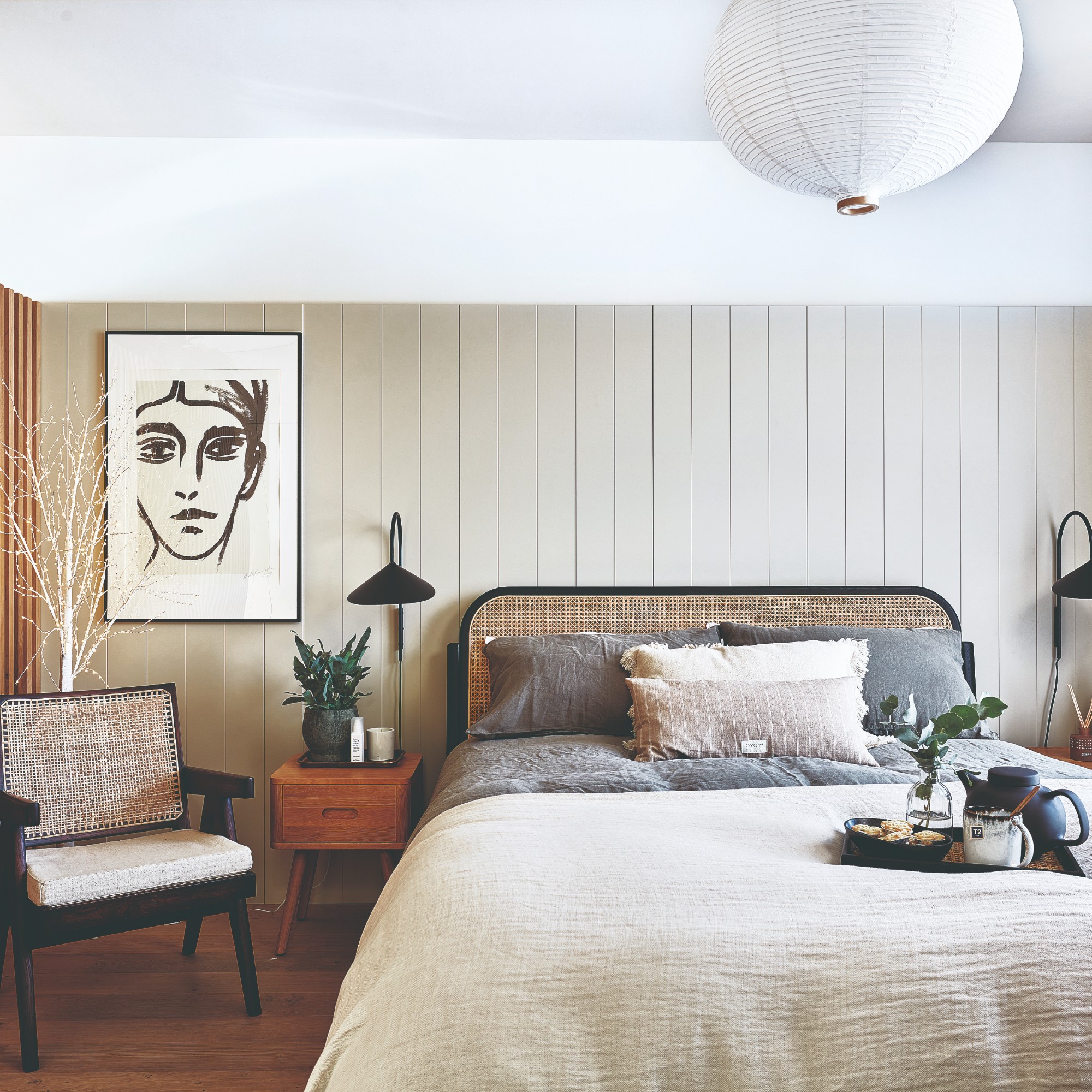
Whether you’re one for quiet luxury bedroom ideas or want to create a super relaxing and calming atmosphere, you really can’t go wrong with neutral shades. Especially since neutrals go with absolutely everything.
‘Timeless and versatile, neutrals are colours that form the foundation of various design styles,’ says Bailey Oates, colour expert at Earthborn. ‘Think beige, cream, grey, stone and ecru shades, all of these hues bring a warming appeal that not only grounds the space but creates a sense of calm too, perfect for the bedroom.’
But Marianne Shillingford, creative director and colour expert at Dulux, adds that only neutrals with warm neutrals should be chosen for the bedroom, ‘Neutrals, which I think of as the laidback peacemakers of colour, always have a calming effect, but in a bedroom they should have warm undertones like Knotted Twine or Gentle Fawn – easy on the senses and work with everything effortlessly.’
Sign up to our newsletter for style inspiration, real homes, project and garden advice and shopping know-how
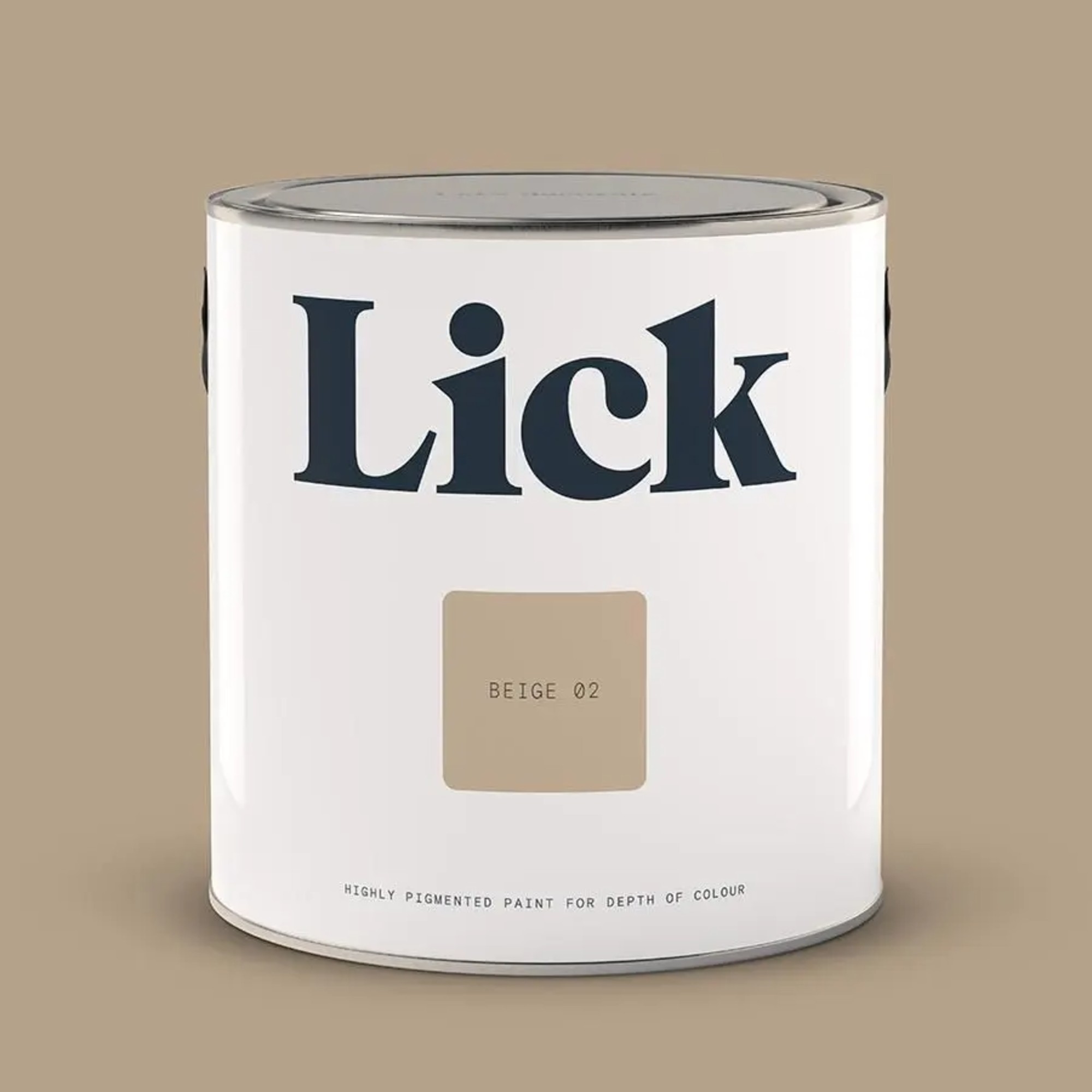
If we get a chance to make our homes look anything like the ever-so-stylish Soho House, you bet we'll jump at the opportunity. Partnering with the iconic establishment, Lick's created the perfect cosy beige that feels warm and chic at the same time.
2. Take inspiration from nature
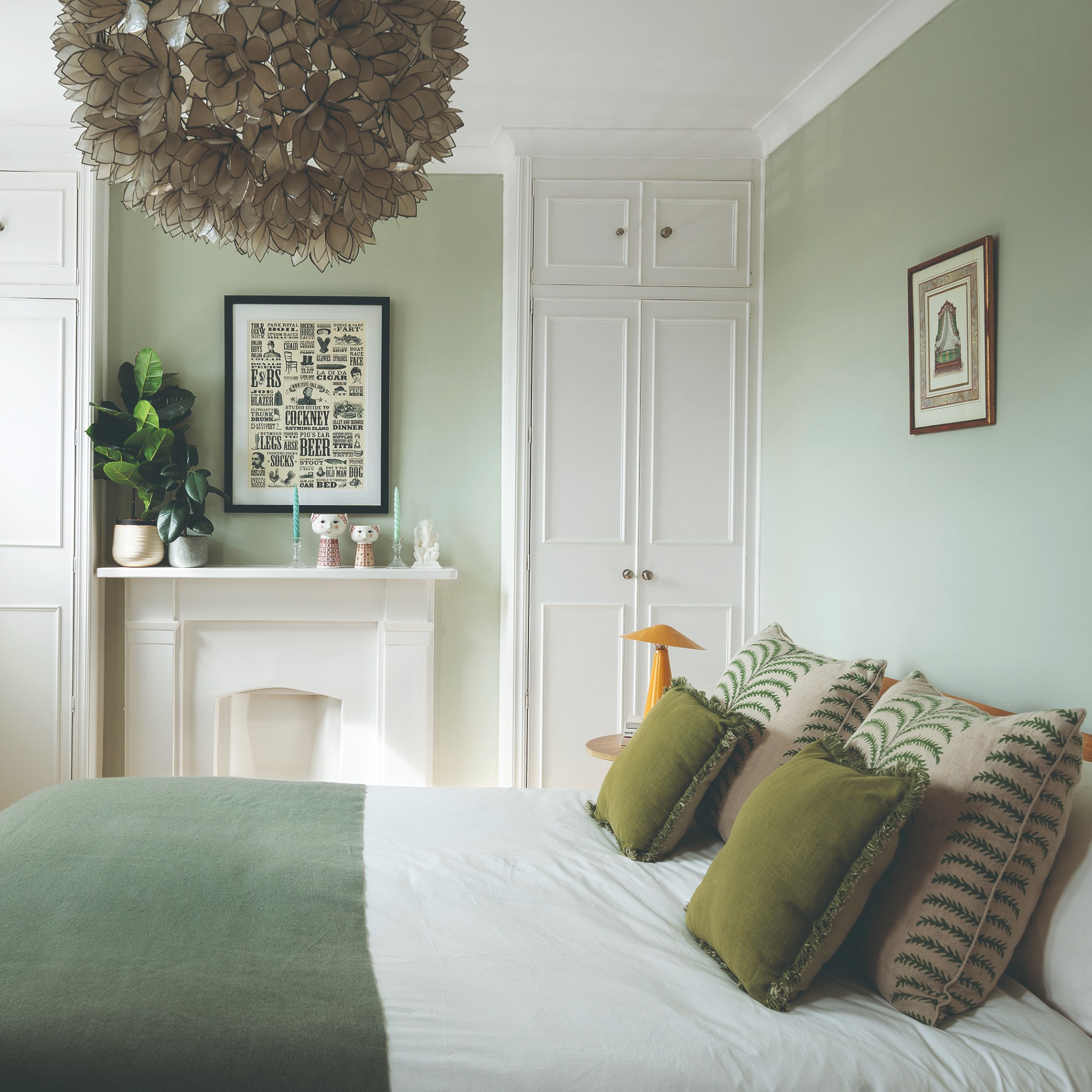
Nature - or at least the idea of it - summons soothing visions which is exactly the kind of vibe that you’d want in a bedroom. That’s exactly why nature references, the paint colour palette included, work so well in bedrooms and why green bedroom ideas are so popular.
‘Drawing on nature and bringing the outdoors in is a great way to create a calming oasis. Soft, gentle blues such as Crown’s Moonlight Bay will have calming, tranquil effects, evoking the feelings of blue skies and seas which support relaxation and renewal. Greens are a hugely popular choice for bedrooms due to their association with nature, health and rejuvenation. They’re also incredibly versatile, offering a whole range of hues from emerald to lime and sage, meaning you can create an entire palette using shades from the same family. To really channel the grounding and soothing effect of nature, combine a mix of deep and light greens in the bedroom, mirroring the rich, lush tones you would find in a forest,’ Kathryn at Crown advises.
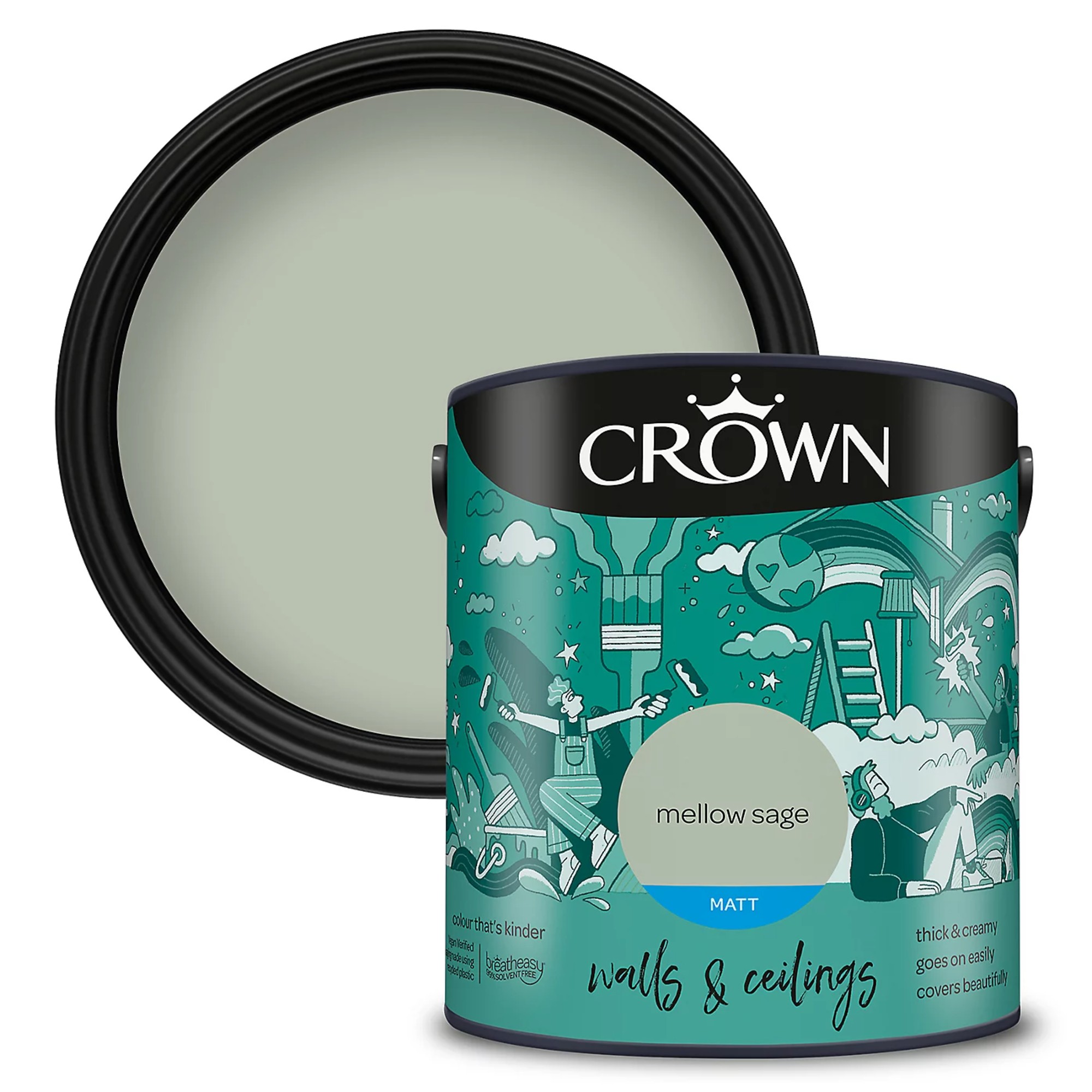
Green is one of the most popular colour go-tos for bedrooms across the board, largely for its soothing nature and its association with nature and biophilic design ideas. But a soft green like this Mellow Sage is the best way to embrace this colour in a bedroom.
3. Embrace the colour of the year on your walls
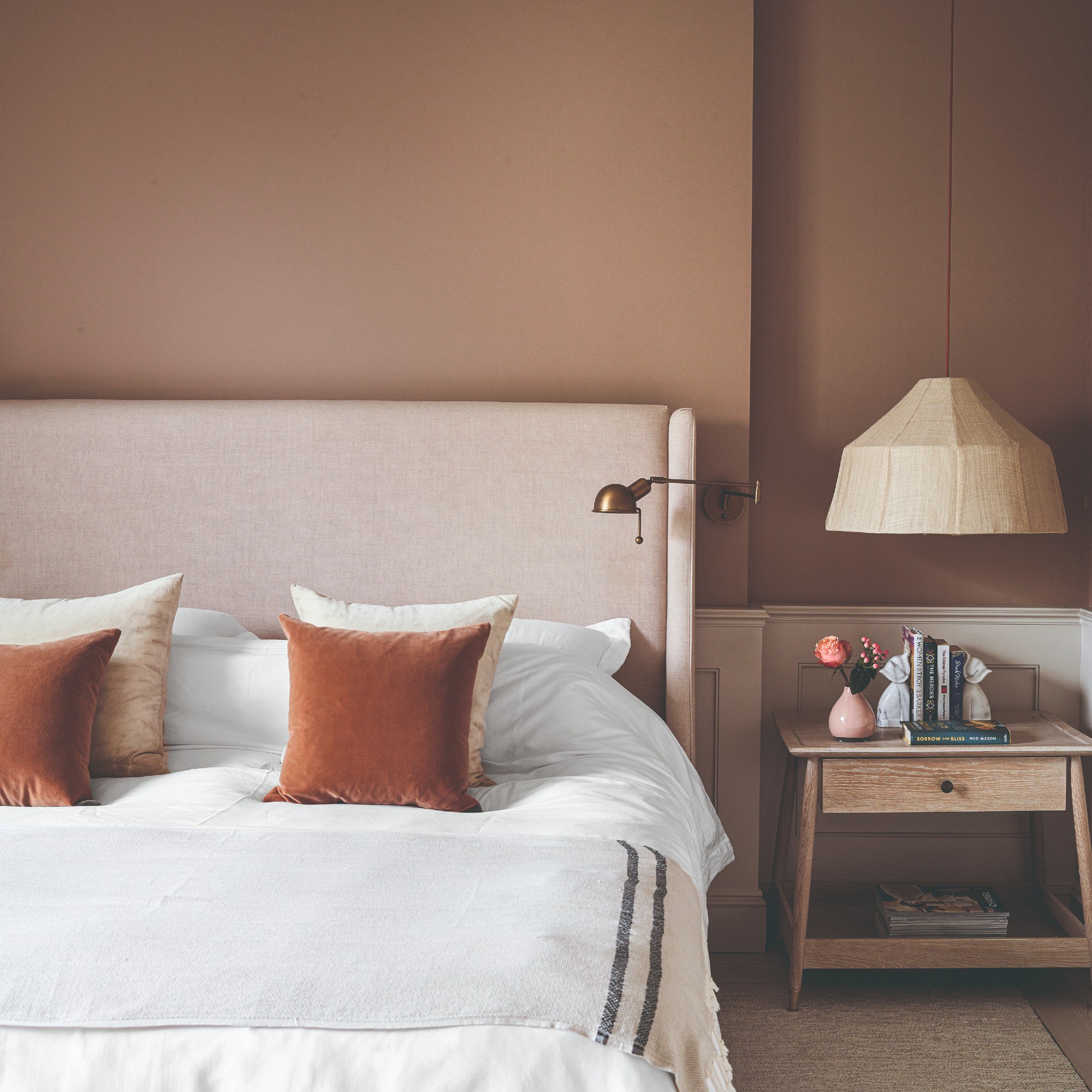
Ever since Pantone named Mocha Mousse its colour of the year for 2025, brown has been the go-to shade for pretty much anywhere in the home – including the bedroom. And deservingly so as there are many different ways to decorate with Mocha Mousse and similar shades of brown.
‘A more rogue suggestion is brown, especially if you think of a rich salted caramel chocolate like Spiced Honey. It looks and feels dreamy and luxurious. Definitely an aid to sweeter night’s sleep,’ Marianne at Dulux suggests.
4. Create an ombre effect
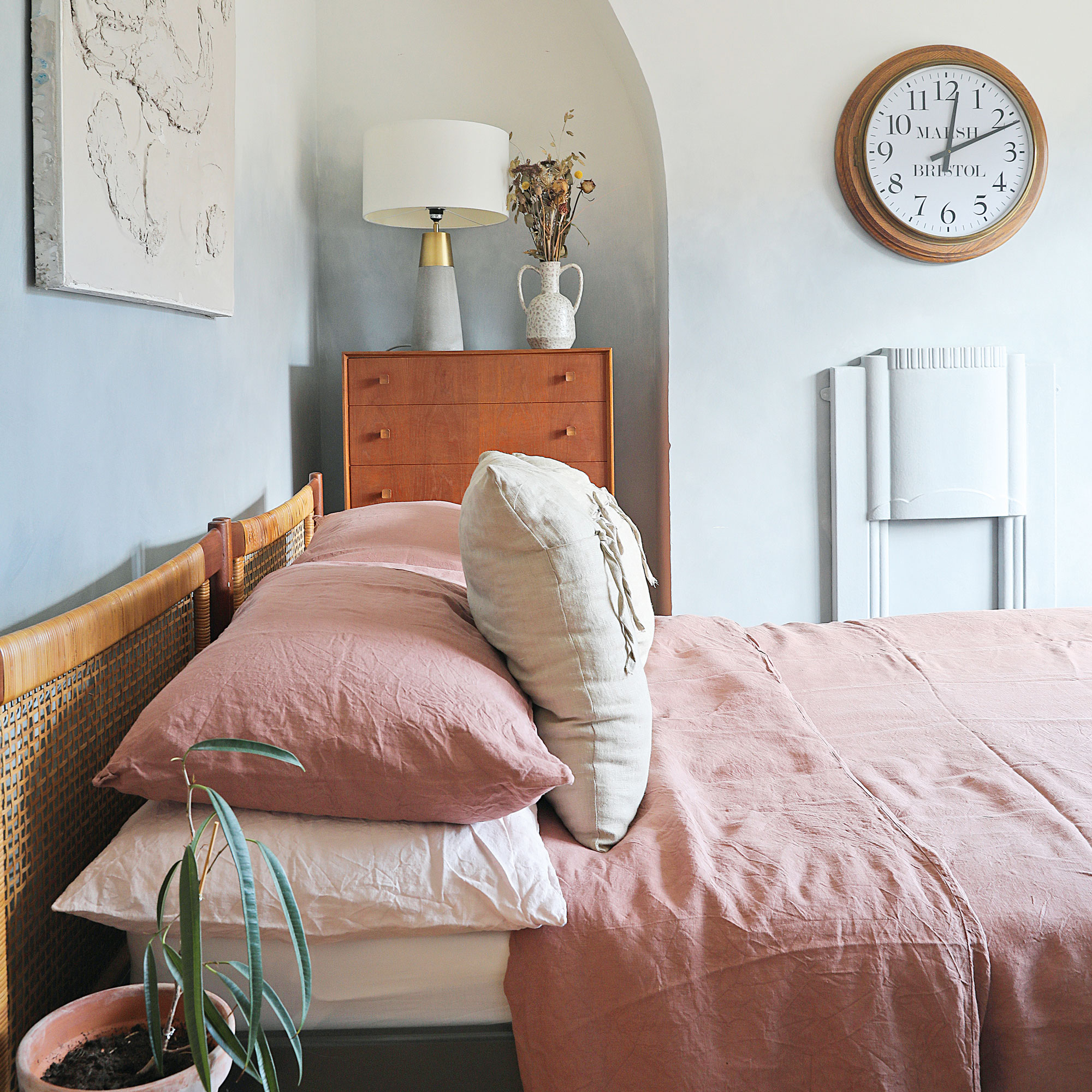
If you’re after a soothing paint technique that will look beautifully serene on your bedroom walls then we can’t recommend the ombre paint trend enough.
‘A blended ombre effect with two tones of the same colour can be really effective in a bedroom because it reflects the horizon where land and sky meet and creates a familiar balancing and soothing effect,’ Marianne at Dulux says.
5. Take your colour round the corner
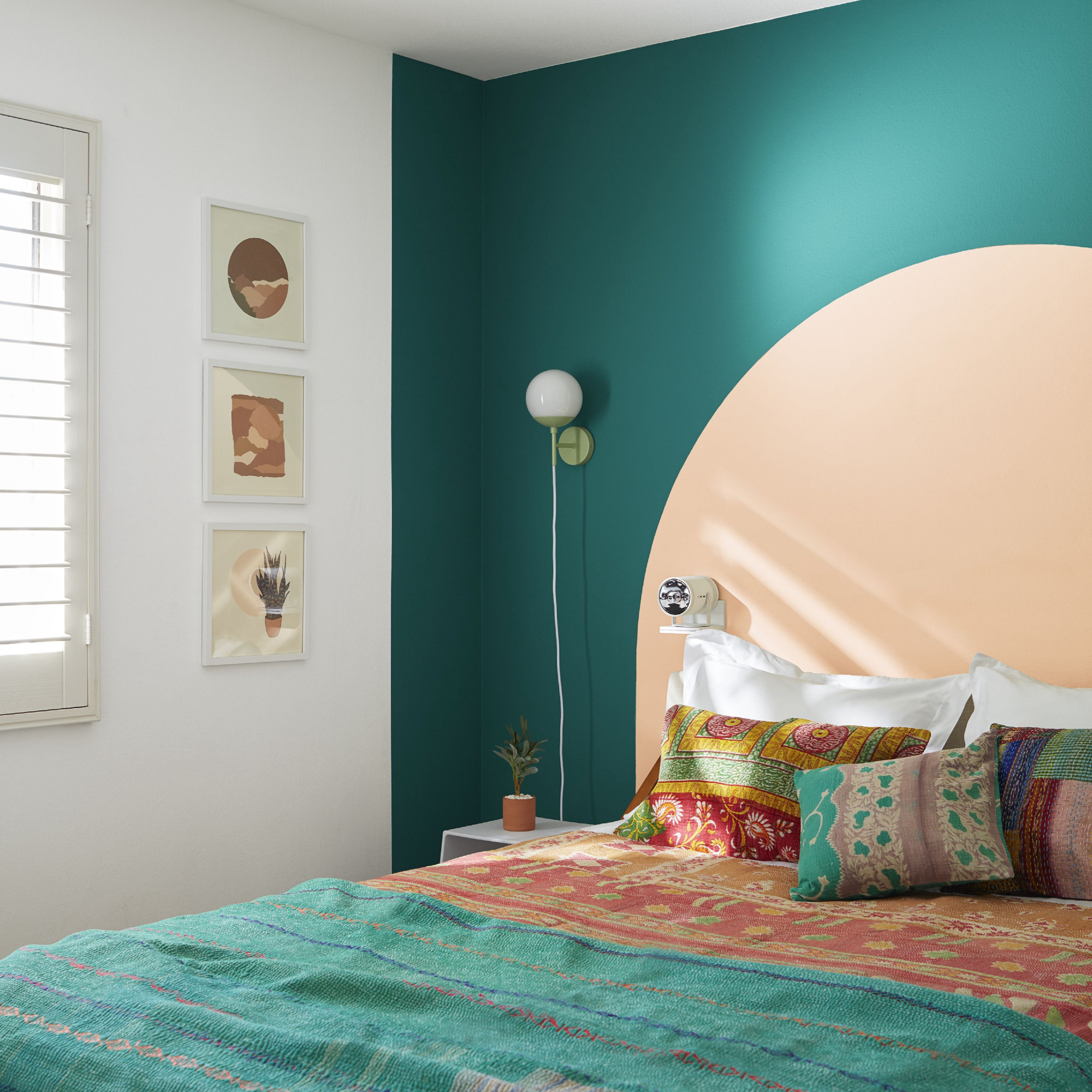
Whatever colour you pick for your new bedroom scheme think outside of the box so to speak and take the colour a little further so it doesn't end in the corner. This works well when you want to create a focal wall.
'A subtle but effective way of adding paint to a bedroom is to take the colour around the corner of a wall,' says Helen Shaw, director of marketing at Benjamin Moore. 'This creates an enveloping feel, enhancing the cosiness of a room. This technique is ideal for the bedroom where you want to feel safe and relaxed – consider positioning the bed within this area for the ultimate safe haven.'
6. Make a statement with coral
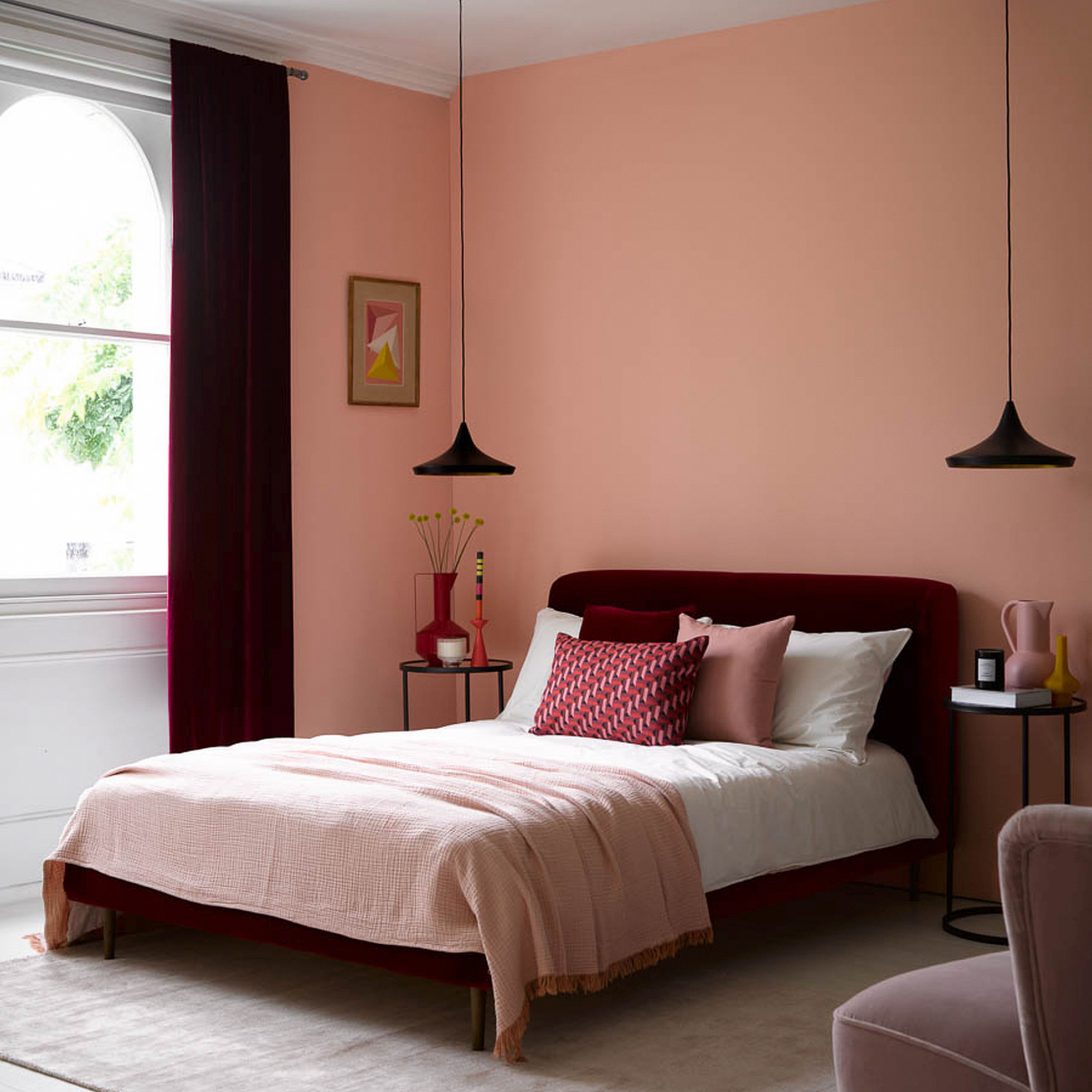
You may have noticed that grey, although still a thoroughly useful colour, is not being used as abundantly right now, that's because there's a new colour trend on the street – coral.
'If you’re feeling colour confident, coral is a great option for walls, creating a striking yet soothing note in any space around the home,' says Gisela Lancaster, head of buying at Sofology.
'Following years of grey bedroom walls, embrace the colour and create a scheme with contrasting shades of furniture. Combine with neutral furniture and simple accessories to create a modern minimalist look or introduce metallics and intricate detail, such as fluting, for a more opulent feel.'
7. Love a check? Take them wide and high
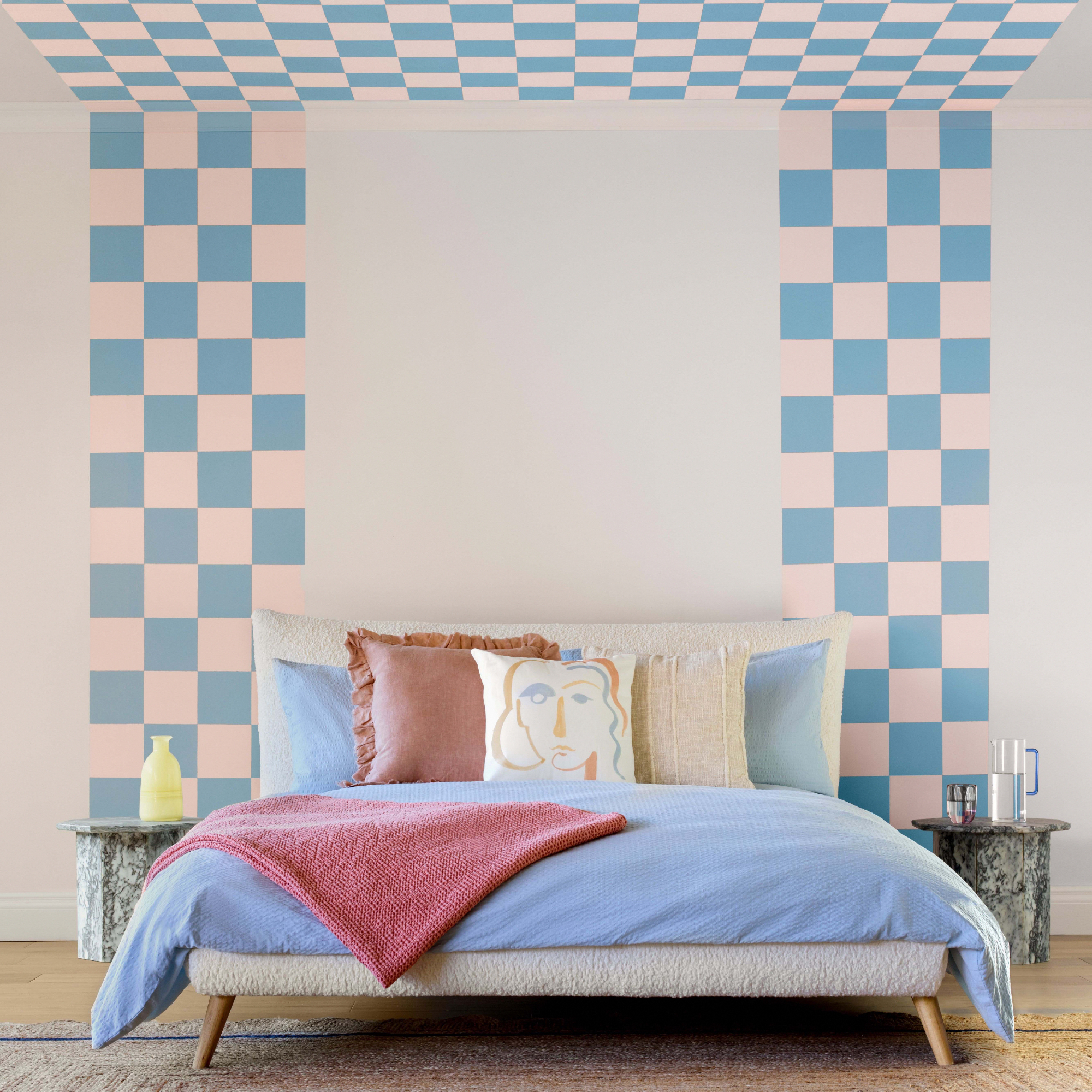
If you want to create a standout bedroom that oozes creativity and fun then consider a checkerboard effect going up your walls, around the bed and above it.
'The ceiling can be forgotten when planning an interior design scheme and it is often assumed that it will simply be painted white,' says Emma Bestley, creative director and co-founder of YesColours. 'A good way of incorporating the ceiling into your design is to consider it as the 5th wall, this will allow you to extend your colour palette and experiment with different shades.
'Get creative and experiment with a bedroom feature wall. Play with patterns to create zones within a room, checkerboard for example works beautifully, a classic pattern which adds a little grandeur. Remember when hand painting, patterns can be scaled accordingly to suit your chosen room.'
8. Love bright accessories? Choose a neutral background
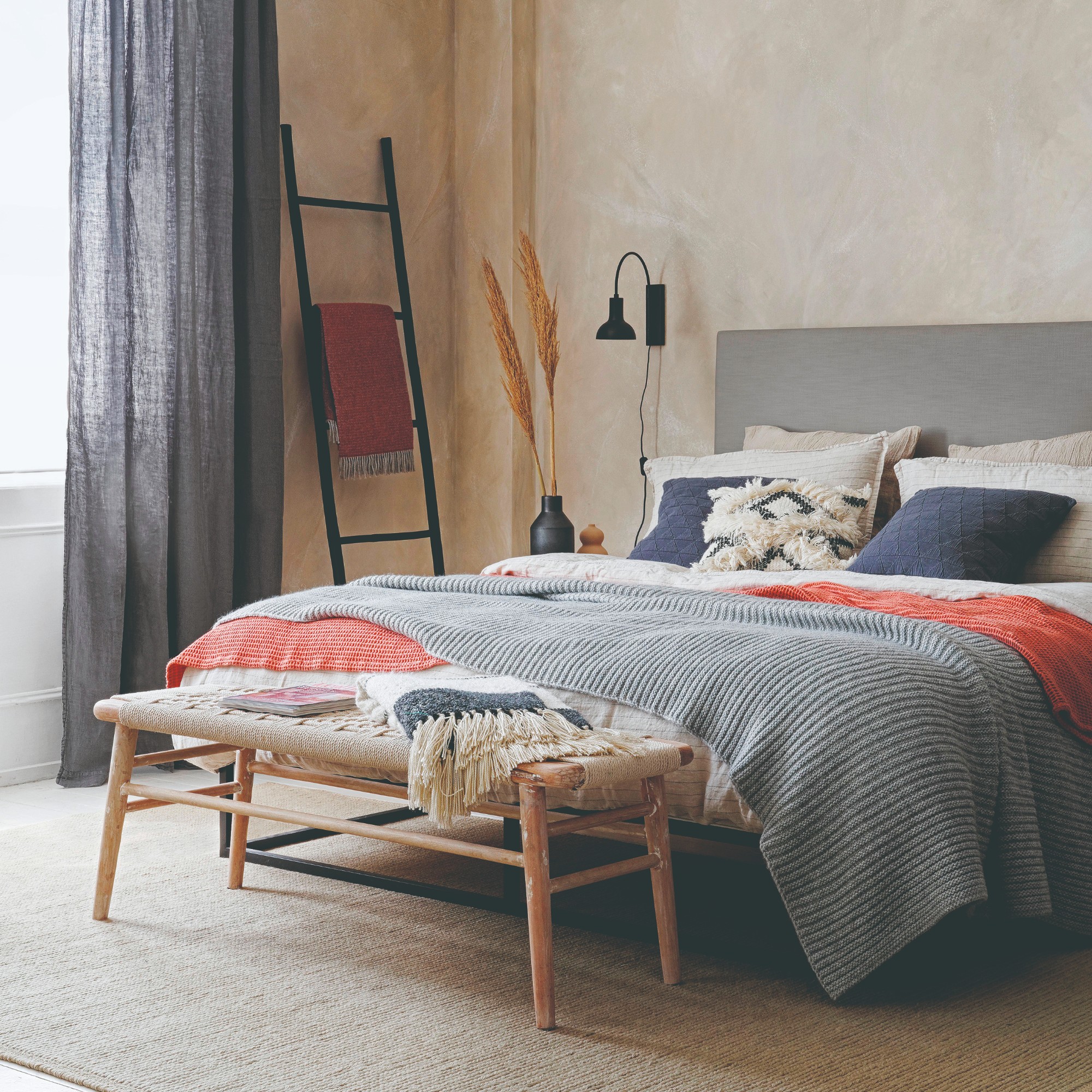
If you adore colour but can't decide what colour to paint your walls then consider a neutral. We know that may sounds dull, but actually it can act as the most perfect blank canvas.
'If colour is your kryptonite, pick a couple of complementary colours that you love from the colour wheel, and weave them through the room,' suggests Patricia Gibbons, head of design at Sofa.com. 'Grey works beautifully in bedrooms, and while most colours do “pop” against grey, were loving greens, reds and yellow at the moment.'
9. Pick a wall colour from your fabric headboard
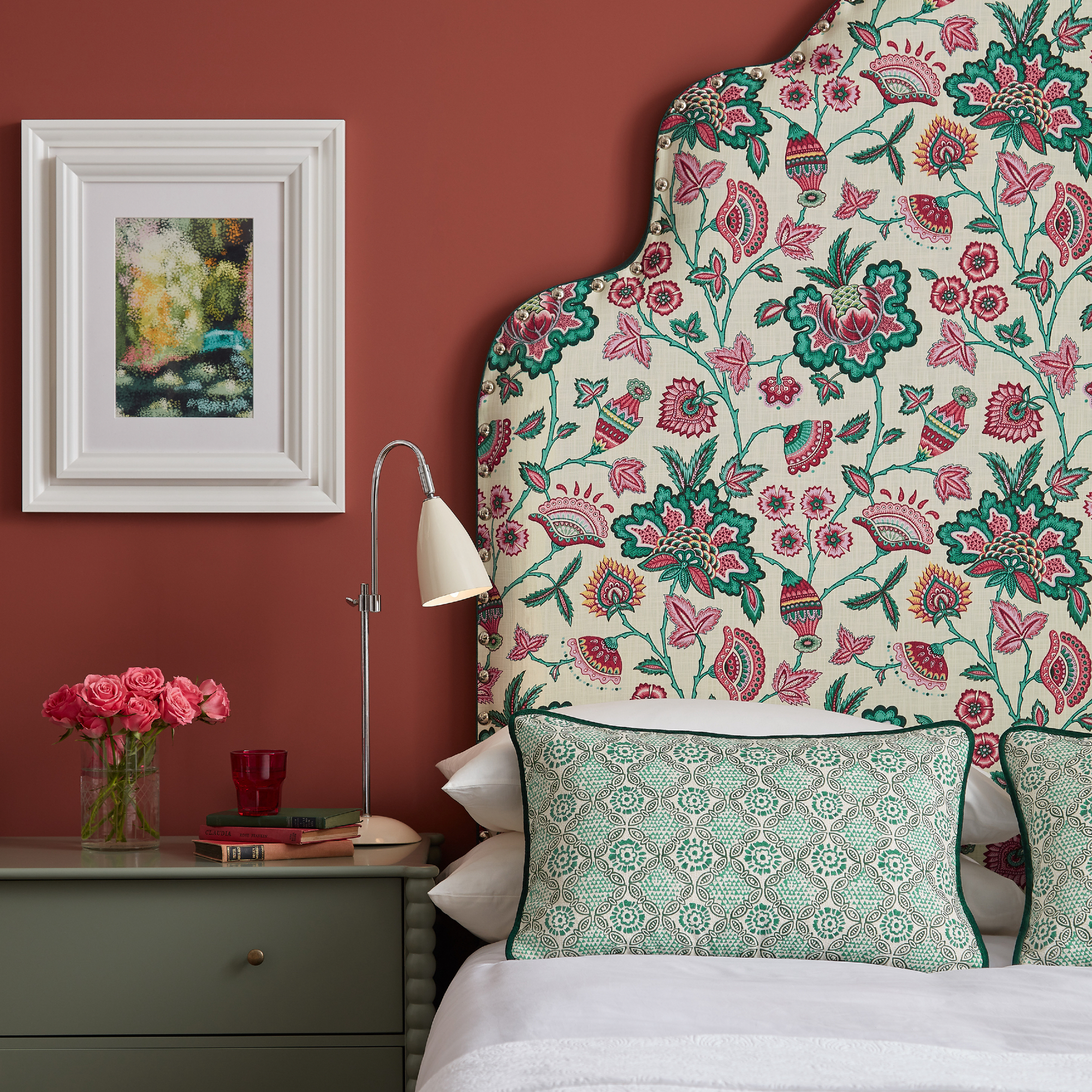
A great starting point for a new wall colour is to look at existing colours within your space. If you love a patterned cushion, curtains or upholstered headboard, then pick a favourite colour in the design and use that.
'Painting your bedroom walls a bold colour is a fantastic way to create a striking and visually captivating backdrop for your headboard,' suggests Debbie Leigh, design manager at ILIV. 'By choosing a bold shade that features a colour found within the fabric of the headboard, you can establish a cohesive and harmonious design scheme that brings the entire room together.
'Bold wall colours have the power to transform the atmosphere of a space, injecting it with energy, personality, and a sense of drama. They serve as a focal point, drawing attention to the headboard and emphasizing its presence in the room. Whether you opt for a vibrant jewel tone, a deep and moody hue, or a vivid shade that makes a strong statement, the impact will be undeniable.'
10. Colour drench all over
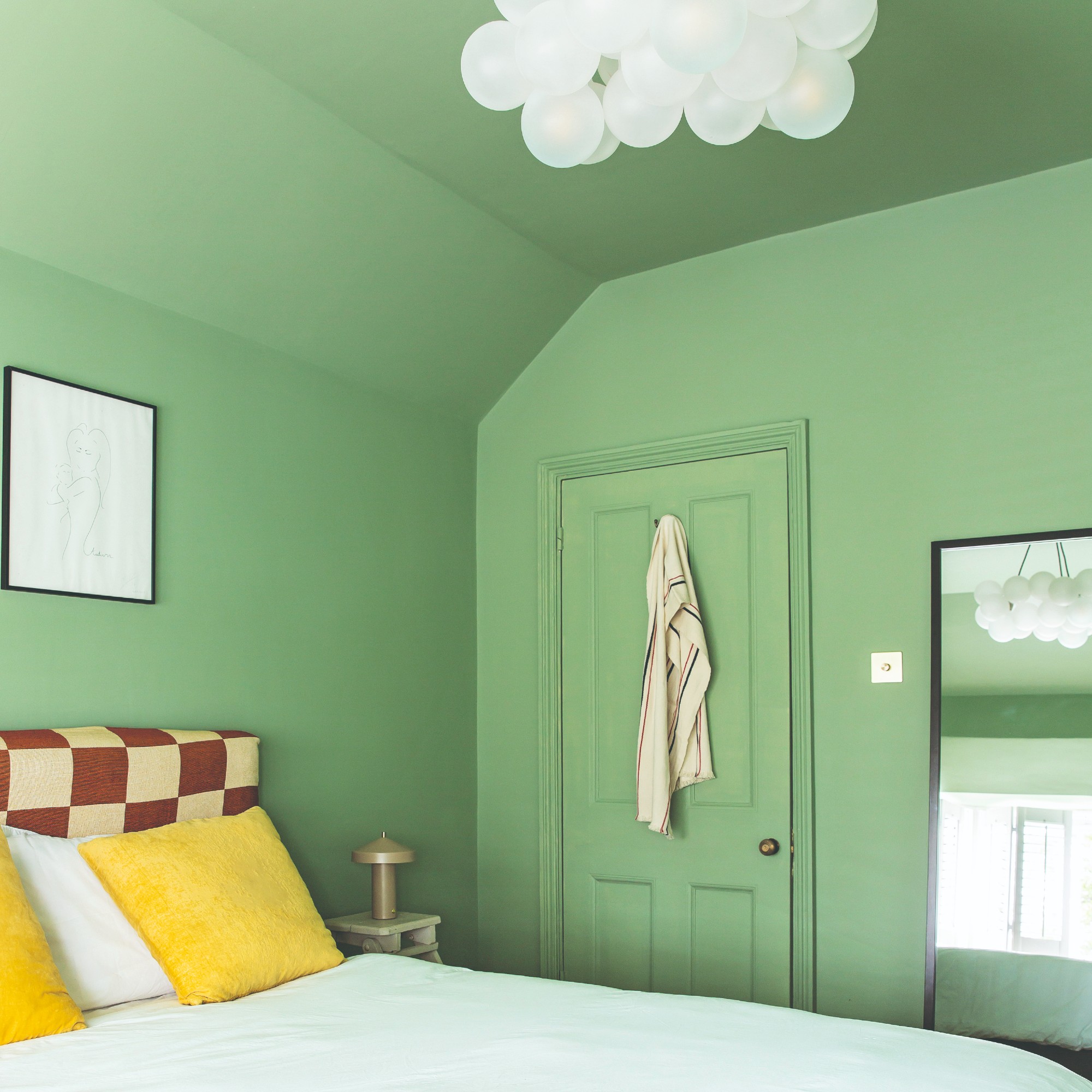
Colour drenching is one of the most popular paint trends currently, is shows no signs of abating so give it whirl!
'If you’re willing to experiment a little, colour drenching in a bedroom is a great way to create a calming environment by giving the illusion of cocooning within the space – it also minimises parts of the room that draw interest by having one colour across walls, woodwork and ceilings, whilst still including tonal changes from light and shadows,' explains Caroline Woolmer, head of design at Lucie Annabel.
What's great about this paint trend is that it works with any colour – from the palest shades to the darkest.
11. Pick a trio of colours
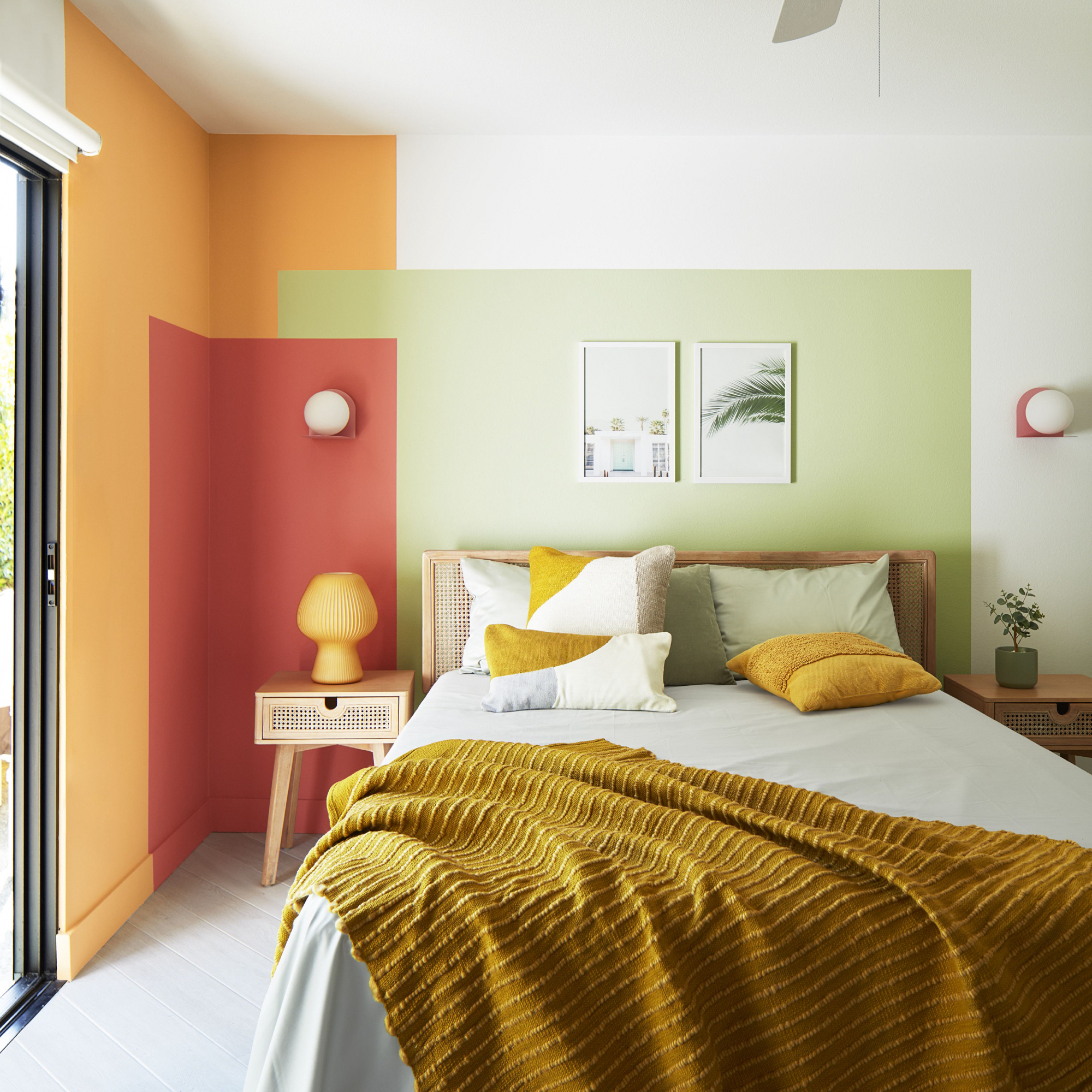
Colour blocking is a known interior design application these days, but instead of picking the usual single or dual colours, consider a trio instead.
'Colour blocking within the bedroom is a great way to add interest whilst also creating different zones within the space,' Helen at Benjamin Moore says.
'Choose shades and combinations which work together in harmony – bright colours are great for delivering a dose of uplifting energy and dynamism into our lives. For example, orange is the definition of an elevating shade as it evokes a sense of warmth and comfort, ideal for a bedroom. For a travel-inspired colour palette, pair with dark coral and sage green for the ultimate Palm Springs look.'
12. Update with painted tongue & groove
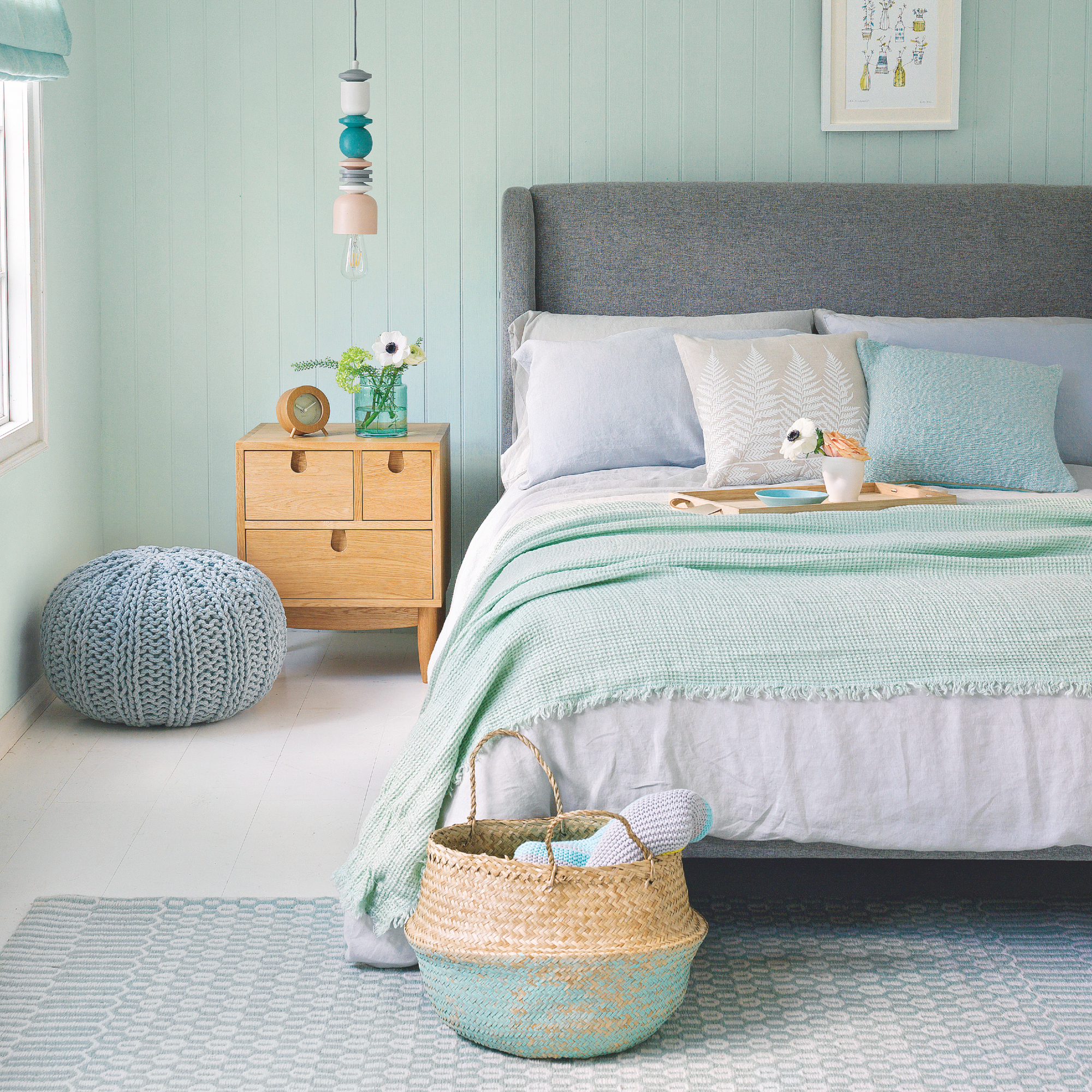
A tongue and groove bedroom wall panelling is a fabulous surface for paint and if you don't have it already it's another easy update to consider. Ideal for creating a chalet type feel it looks great painted in any colour.
Use a pale shade if you have a small bedroom as it will create the illusion of space and the vertical aspect of the tongue and groove will make your ceiling appear taller than it is.
13. Paint two thirds of your wall
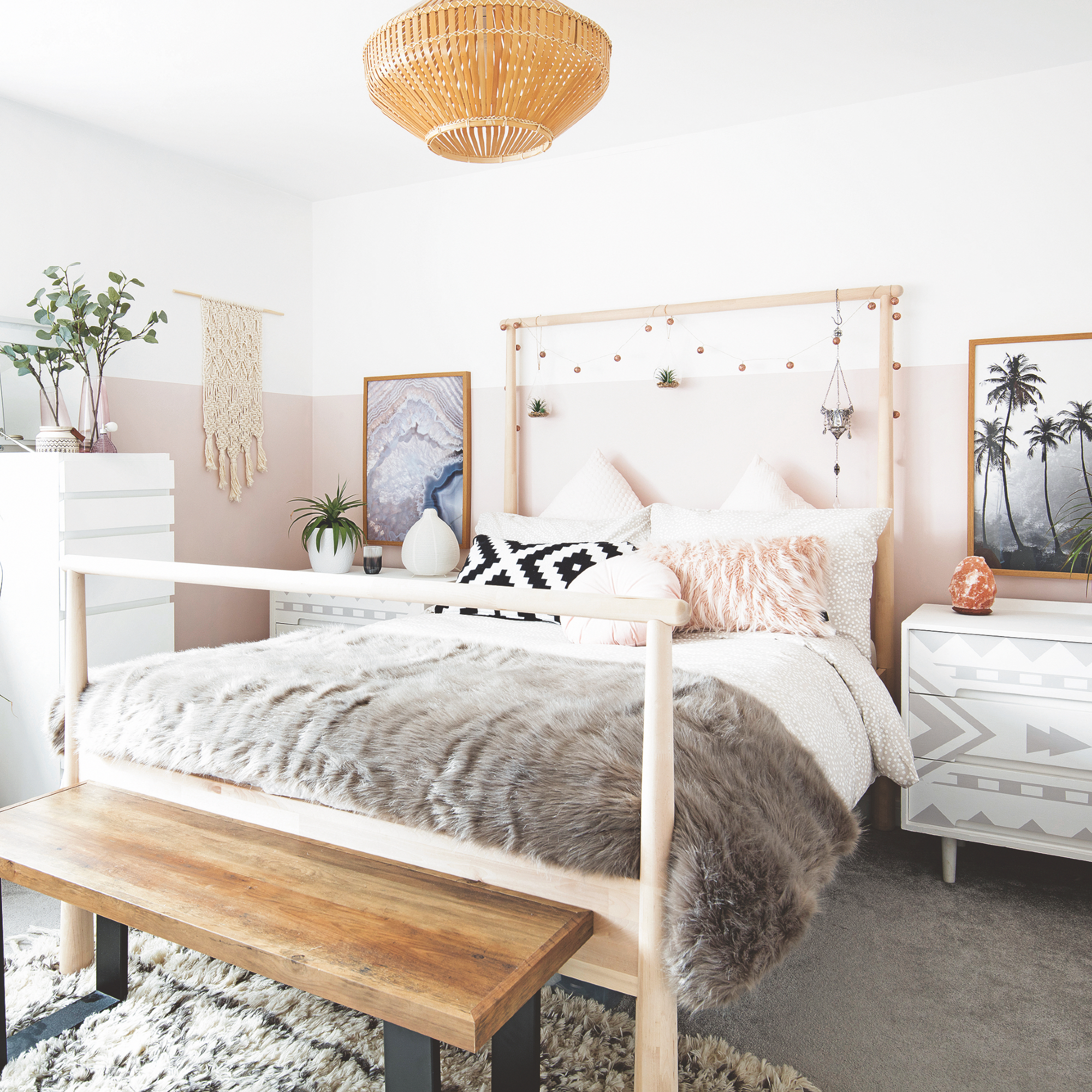
If you want to add warmth to an all white scheme then choose a pale blush shade and apply it to the bottom two thirds of you walls and keep the rest white. It will act as a border around your bed which will zone it too.
Of course you can do this with any colour combination, but it works well with lighter shades in bedrooms that are tight on space.
14. Repeat tones of the same colour
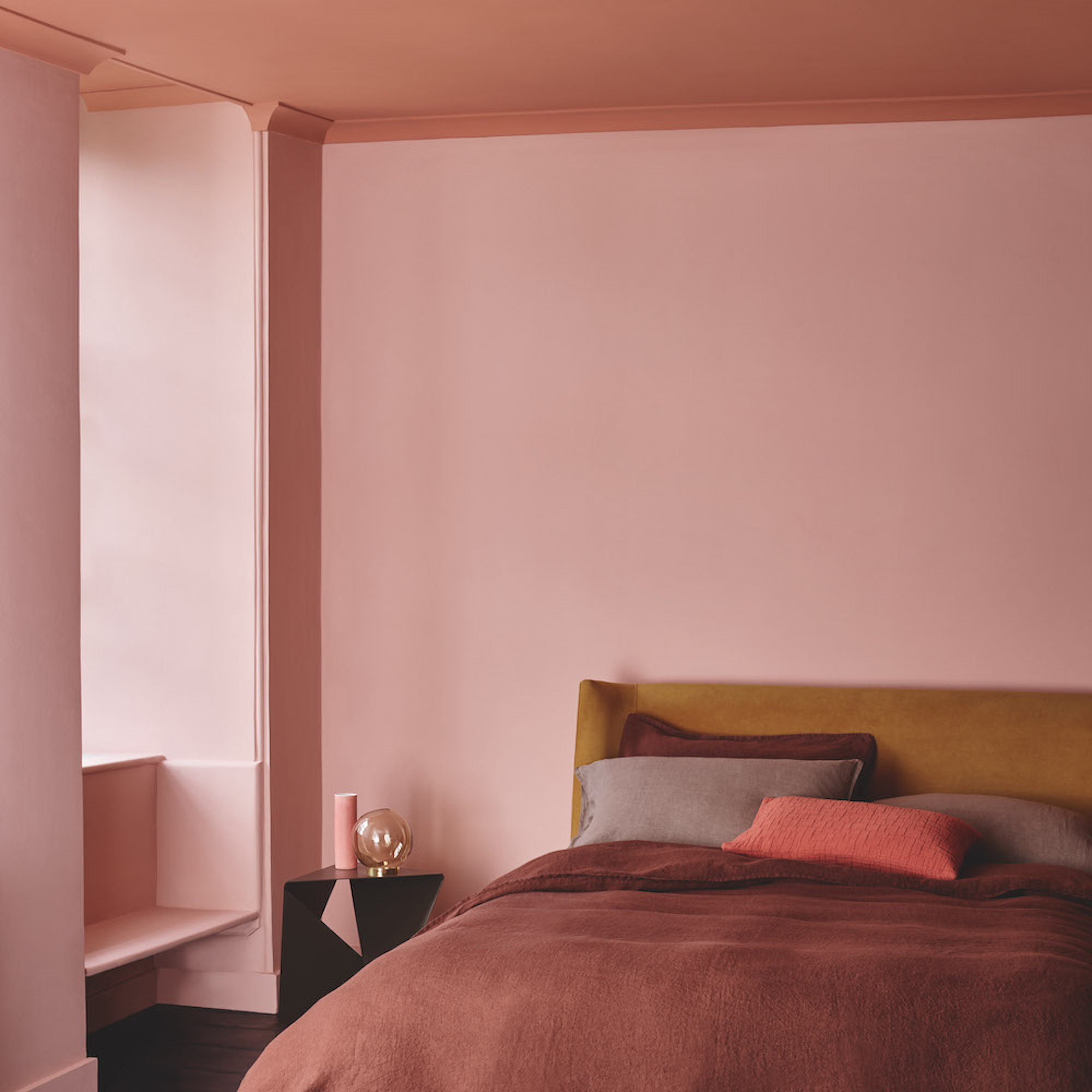
Painting two walls in the same colour and the ceiling in a second deep shade will create a cosy feel – nowadays, that's called double drenching.
'The repetition of a central colour will help enhance the mood you are trying to convey,' says Justyna Korczynska, colour consultant at Crown. 'Paint several walls the same colour of varying tones, or connect the colour through the room with matching accessories.
Get creative with DIY by painting a plant holder or a chair in a similar shade to emphasise the tone of the bedroom. The theme can be further enhanced by the use of textiles in the room, for instance in the choose of bedding, or a colour matched rug or blanket.'
15. Create a striking headboard
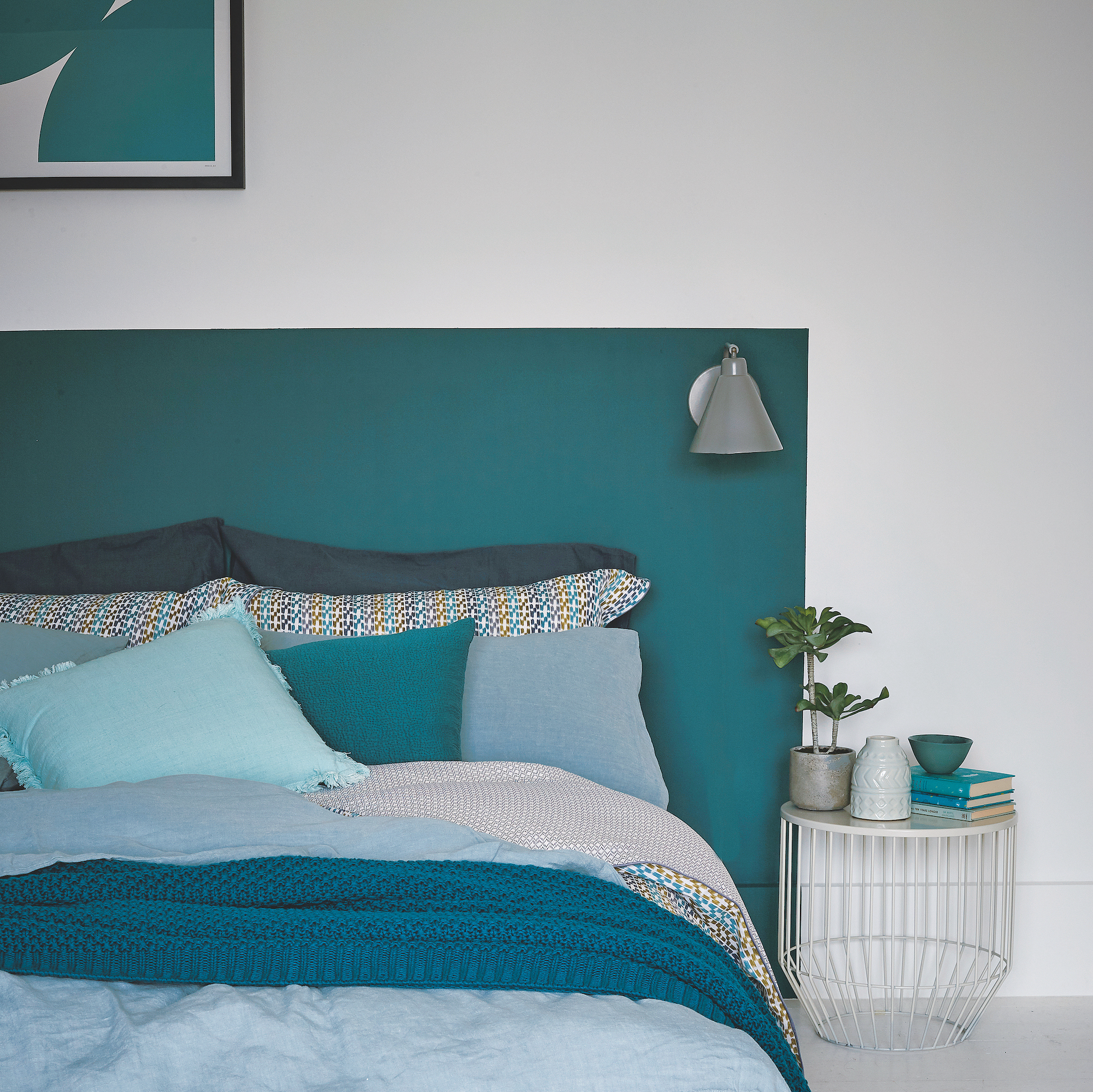
If you’re tight on space (or budget), creating a hand-painted DIY headboard idea is a super affordable, easy way to transform a bedroom wall. Keep things simple with a panel of colour for your chosen colour scheme that can be easily changed, moved or erased.
'Painting a headboard is a really clever way to maximise space whilst also injecting colour into the bedroom without it being overpowering. Creating the illusion of a headboard is a simple way to impactfully alter the look of a room simply by adding colour without spending hours re-ordering and re-designing the entire space. If you really love a colour but don’t want to commit to painting entire walls, this is a brilliant technique as it allows you to still use that shade and inject your personality into your space,' Kathryn at Crown Paint says.
It's a cheaper and less bulky alternative to an upholstered headboard. Choose any paint colour that you fancy, so you can really make it work with your style and scheme. For added interest position a wall light (picked up for a bargain using home decor discount codes to not amp up the budget!) as if it were attached to a real headboard.
16. Go for a painterly effect
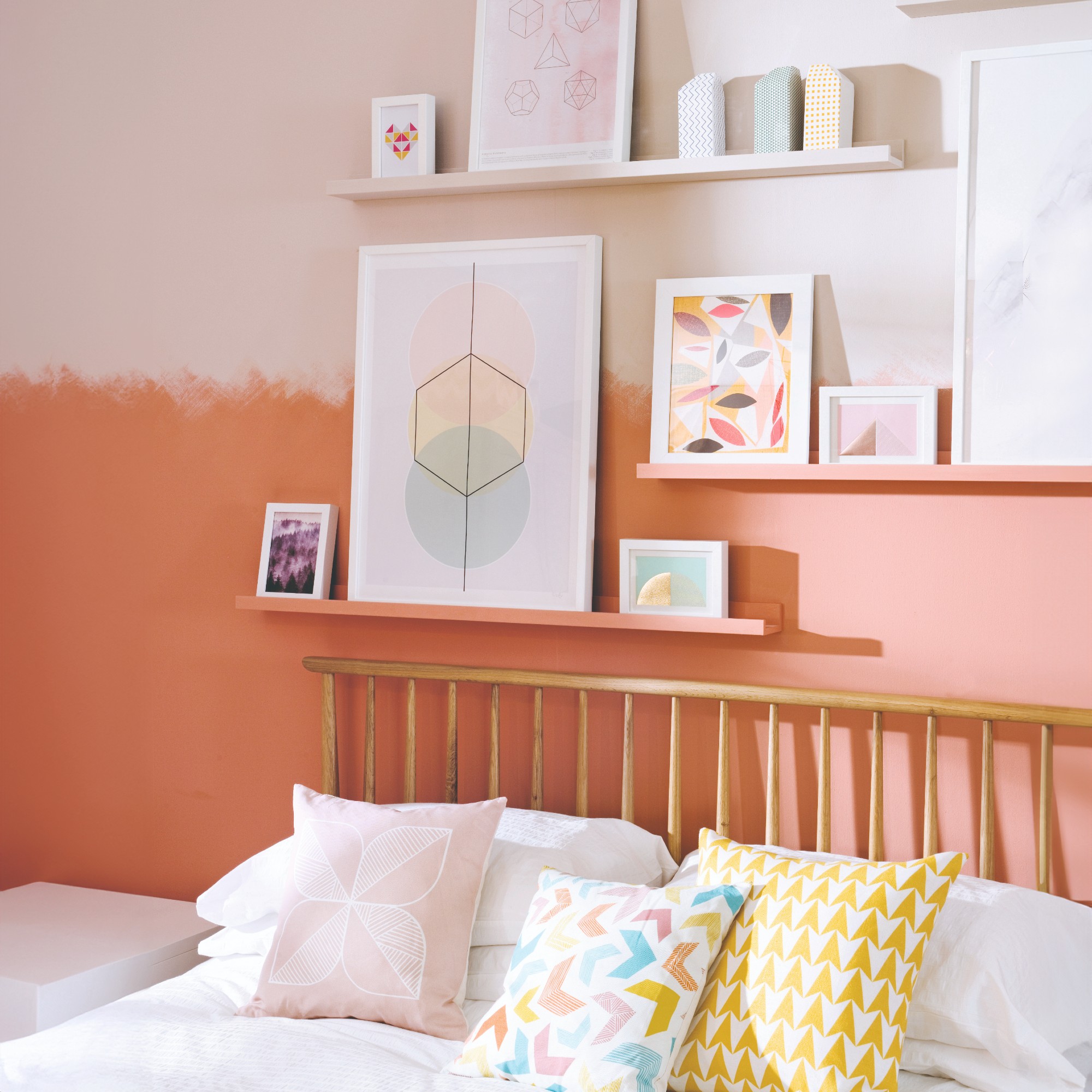
This is a great trick for small bedroom ideas that makes your ceilings seem higher. Choose a colour on the base but then bleed into white and continue the white onto the ceiling, so that your eye doesn't know where the wall ends and the ceiling begins. Paint the bottom in a colour also gives a more cocooning feel when you’re in bed, but the room will remain light and fresh, thanks to the white. Use a roller to paint the bottom half of the walls in the darker colour, finishing the top edge with rough upward strokes of a paintbrush.
Make more of a favourite painting or print by colouring a border around the frame. Use masking tape to mark out a square 8-10cm bigger than your frame and colour it in with leftover paint. Remove the tape and, when the paint’s dry, rehang the picture.
17. Try two-toned walls
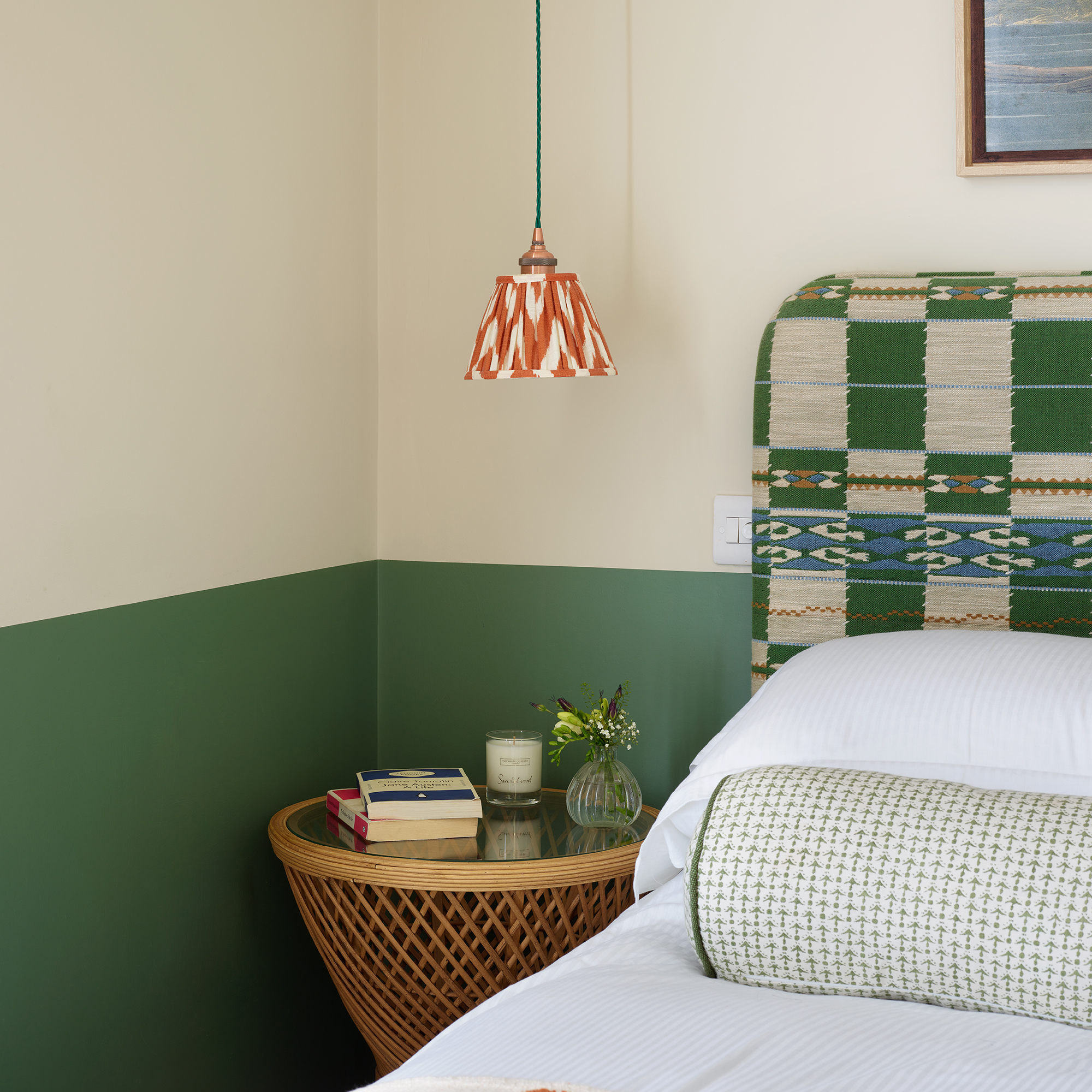
A 'half wall' or a 'split wall' is the description given to painting a wall two colours and dividing them with a crisp line. Painting your wall with two colours is an easy way to give the illusion of a higher or a lower ceiling. To add height to a room, use a darker shade on the bottom half where the heavier colour grounds the room and the lighter colour draws the eye up. Or vice -versa, with the darker colour giving the appearance of a lower ceiling and therefore a cosier, more cocooning room. Worried about how to paint a two tone wall? Don't worry, we promise it's easy!
This trick has the benefit of allowing you to use bold colour without overwhelming your space. It also adds an on-trend graphic edge. Don’t feel you must place the horizontal line in the exact centre, it can be split into thirds, or anywhere you feel the split sits comfortably within your eyeline.
18. Evoke the feeling of a night sky
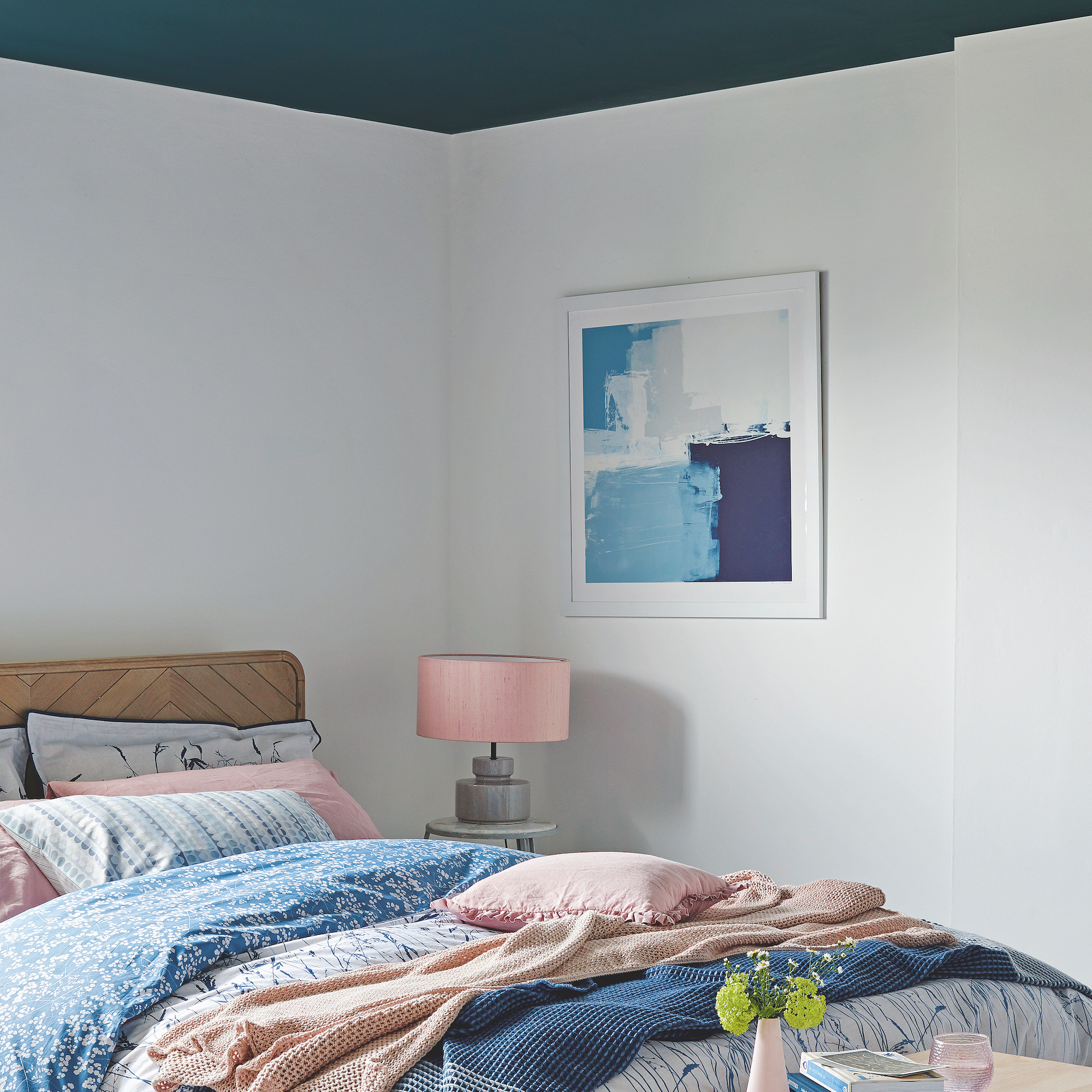
Pale rooms can seem chilly and unwelcoming, especially in artificial light. By painting the ceiling in a deep colour you can really cosy up a bedroom with high ceilings. The paint colour helps bring the ceiling down, fooling the eye into thinking the room is smaller and more intimate. Medium to dark, rich and deep colours such as navy blue and chocolate brown on ceilings warm up the space and make it feel cosy.
So, let's look at how to paint a ceiling. If you have a picture rail, bring the colour down from the ceiling onto the top part of the wall above the rail, this will bring the ceiling down further for a more cocooning feel. Painting a ceiling, or the fifth wall as its sometimes referred to, can add another dimension and character to any room. Here it provides impact to an otherwise plain room.
19. Go for a geometric feature wall
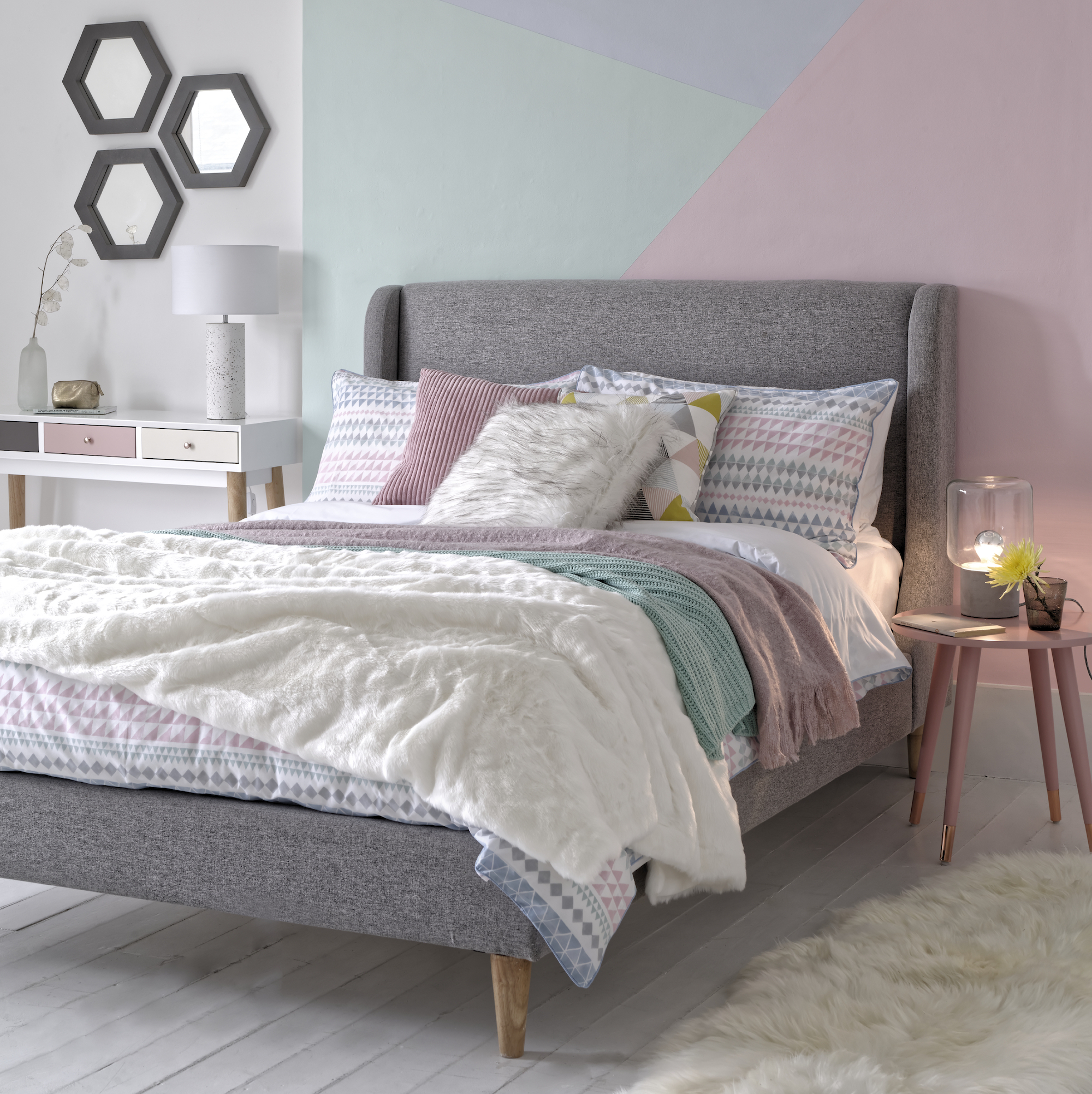
Let the colours from a patterned textile or a piece of art inspire your design. This simple Scandi-style scheme is all about sugary pastel shades. When choosing colours that will sit directly adjacent to each other make sure they are from the same 'tonal family' – so all the colours have the same amount of white and black in them. This means they'll sit together flawlessly.
Keep furniture simple like with this grey marl upholstered bed and painted side table. That way, the feature wall remains the hero in the room.
20. Give a wall its stripes
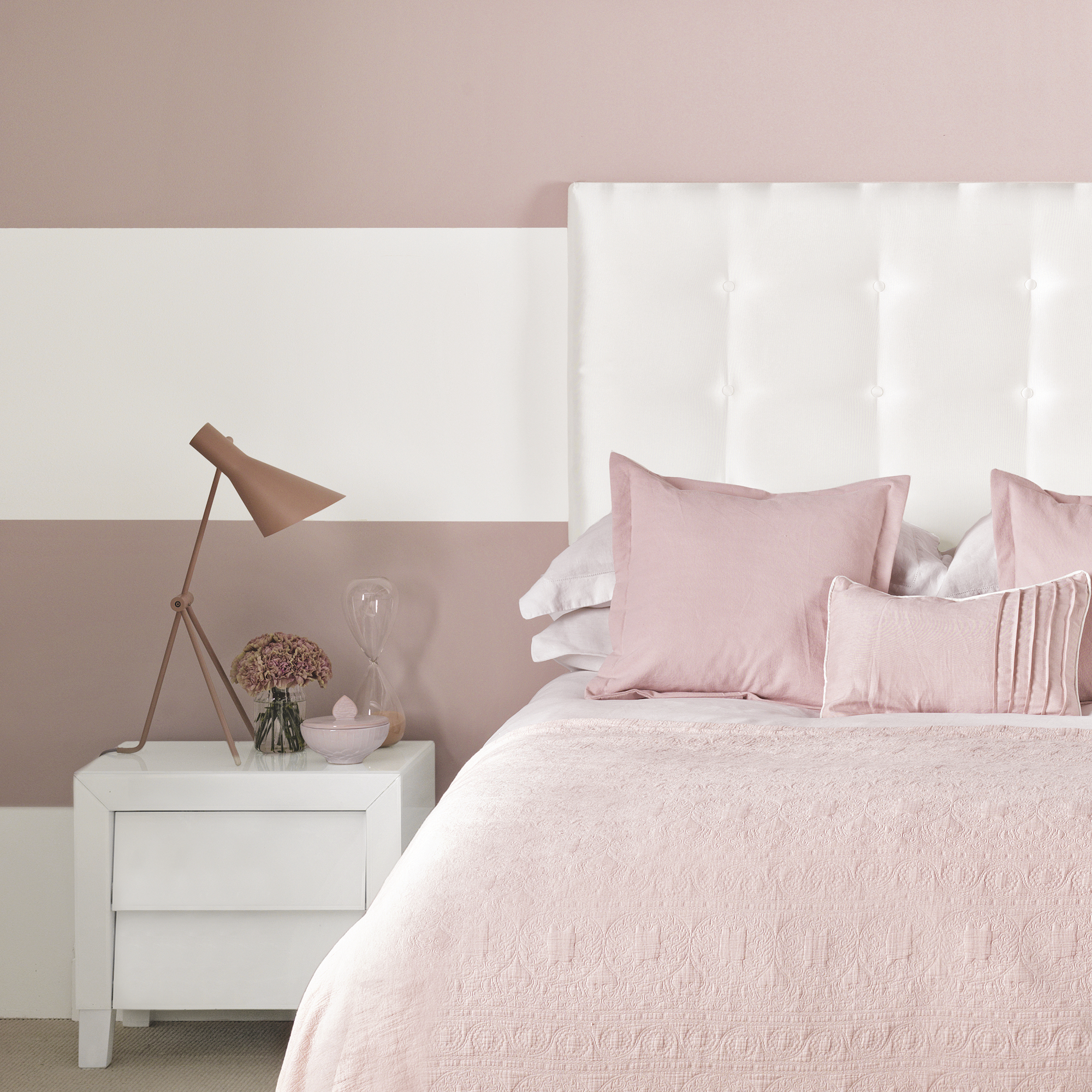
Inject a dose of understated elegance and sophistication into your bedroom by painting bold stripes in blush pink and white. A pink bedroom idea that earns serious style point, stripes on walls and fabrics bring a classic feel to any room and transform a bland bedroom into one with a boutique hotel vibe. Choose from tailored pinstripes or bold broad lines, in either horizontal or vertical stripes to bring order and structure to a space.
In a bedroom stripes work best in soft, pretty shades such as pale pinks, blues and greens. Pair them with white for a crisp, smart feel. Incorporate the woodwork into your stripes by painting the bottom stripe white, so that skirtings can be integrated into the white stripe with ease. Finish by layering silk and satin bedlinen for a sophisticated and glamorous space.
21. Create a cocooning canopy
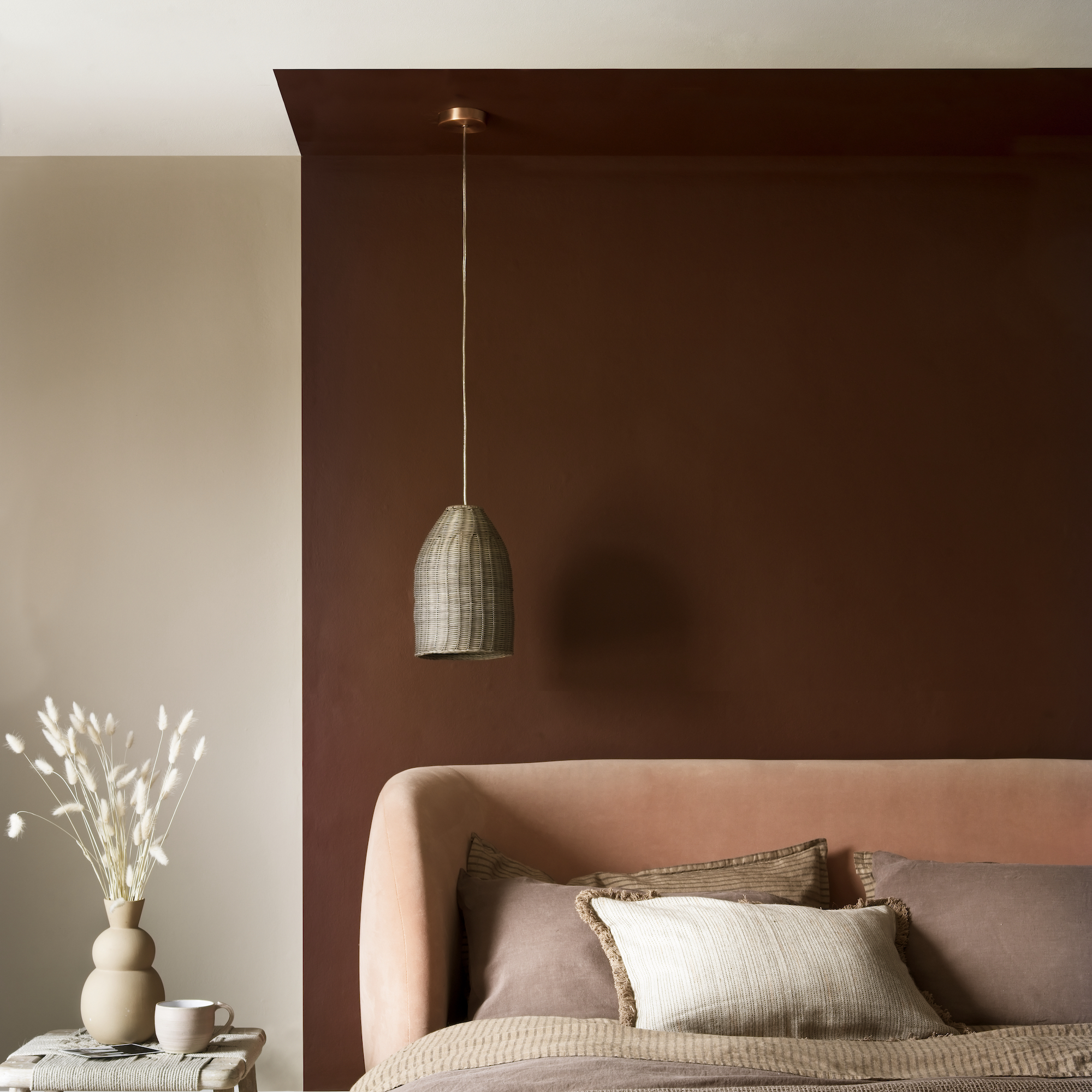
Paint an area from behind the bed, over and onto the ceiling – creating a canopy of colour. Paint behind the total width of the headboard, adding 3 or 4 inches to either side, so the paint line is visible.
'Great technique for a bedroom is painting a canopy over the bed. It involves painting a band of your favourite colour which is the same width as your mattress, upwards from the floor and onto the ceiling over the bed. This gives a cocooning effect which can feel very comforting and it’s lovely to look at when you are heading off to sleep or waking up,' Marianne at Dulux confirms.
Try a shallow canopy onto the ceiling for ease, or continue over the whole length of the bed for added impact. Use tones of chocolate, coffee and caramel in the bedroom to create a warm and restful scheme, mixing velvets, slub linens and textural cottons to add create a wonderfully welcoming scheme.
22. Play with shapes
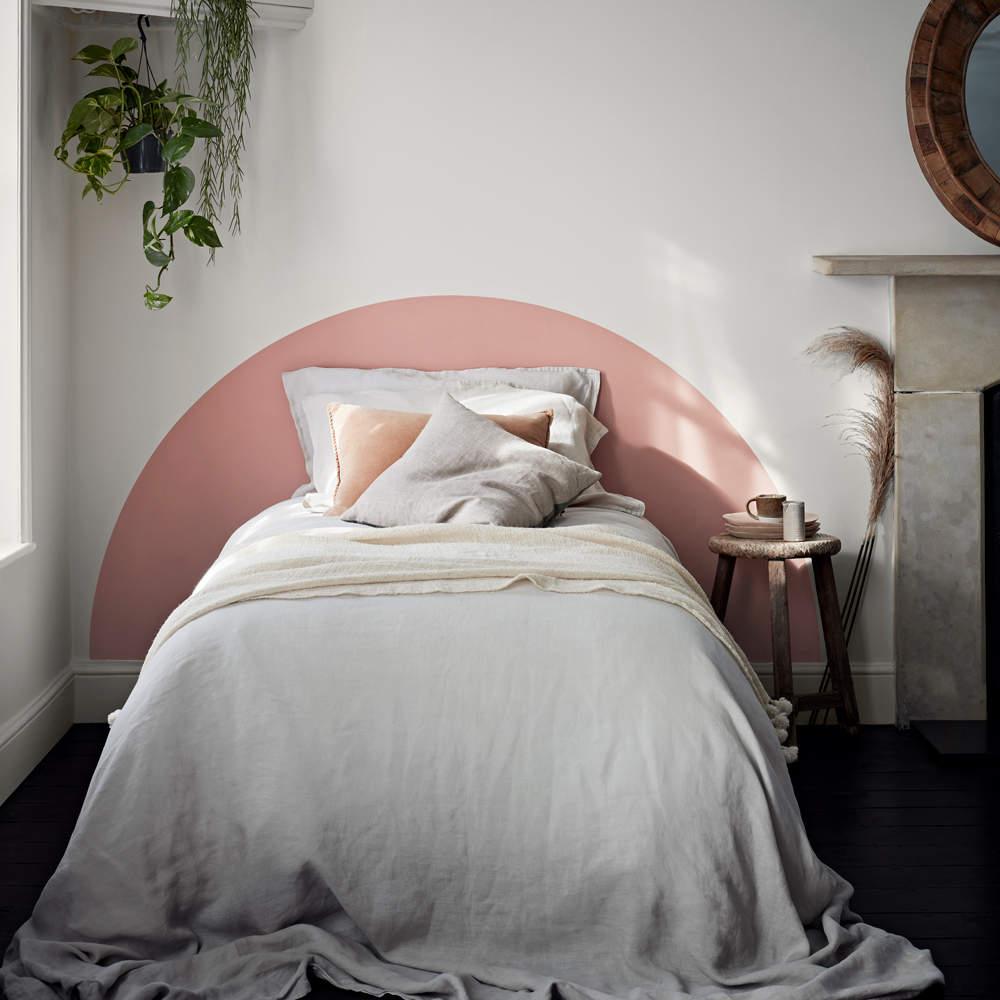
We've mentioned painting behind your headboard but remember you can do it in any shape too, not just square or rectangular.
This fine example of a smart headboard idea by the team at Crown shows how a little imagination can transform your bedroom scheme. Carefully pencil out your chosen shape onto the wall ready to create a defining line using masking tape.
23. Create interest using a variety of coordinating colours
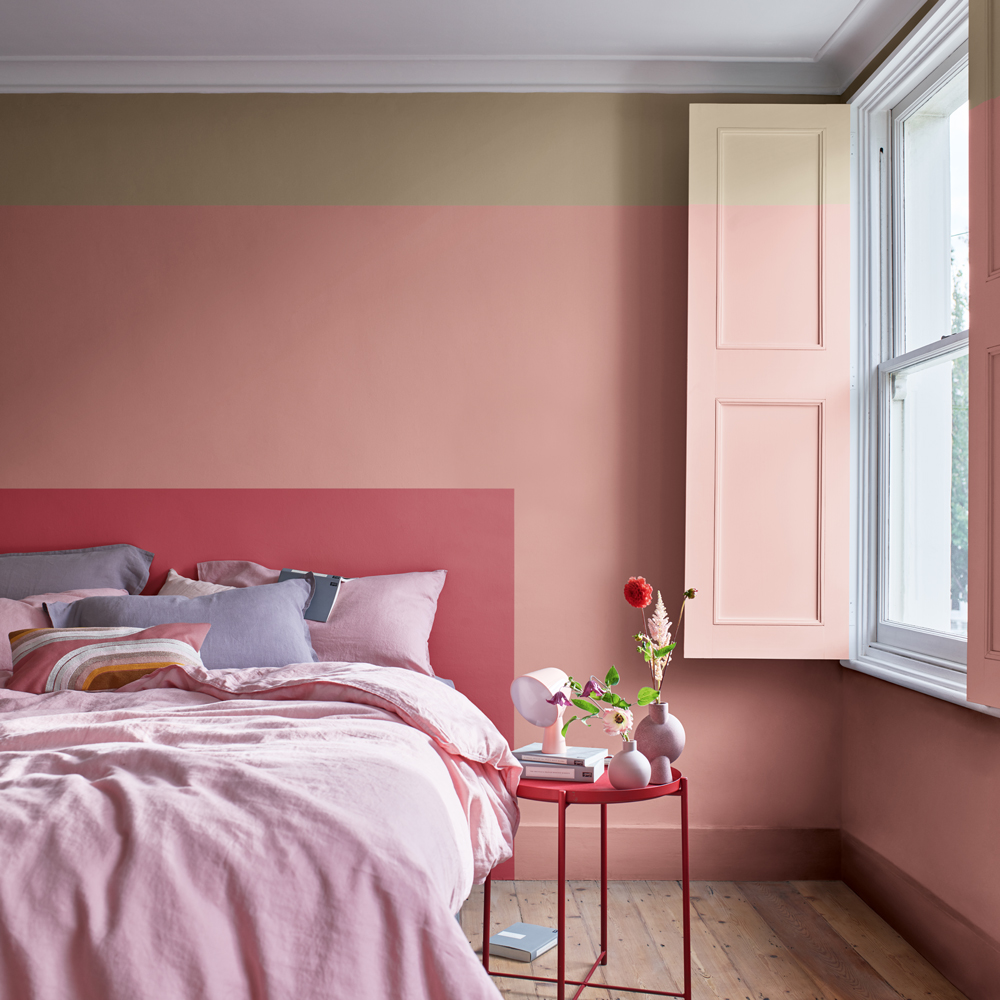
Why go for one bedroom paint colour when you can create a canopy of colours, that all serve a different purpose with the scheme. Use your first choice of colour to paint the majority of the walls. If choosing how to paint skirting boards we suggest using this same shade here, too.
Using a darker gradient of the shade block out a painted section in place of a headboard. Work with a lighter variation of the wall colour to pick out the wood work, such as window surrounds and shutters. Then to add further interest use a completely different colour, but one with the same warmth, to paint a picture rail-like panel at the top of the wall to frame the space.
24. Add texture with thoughtful paint effects
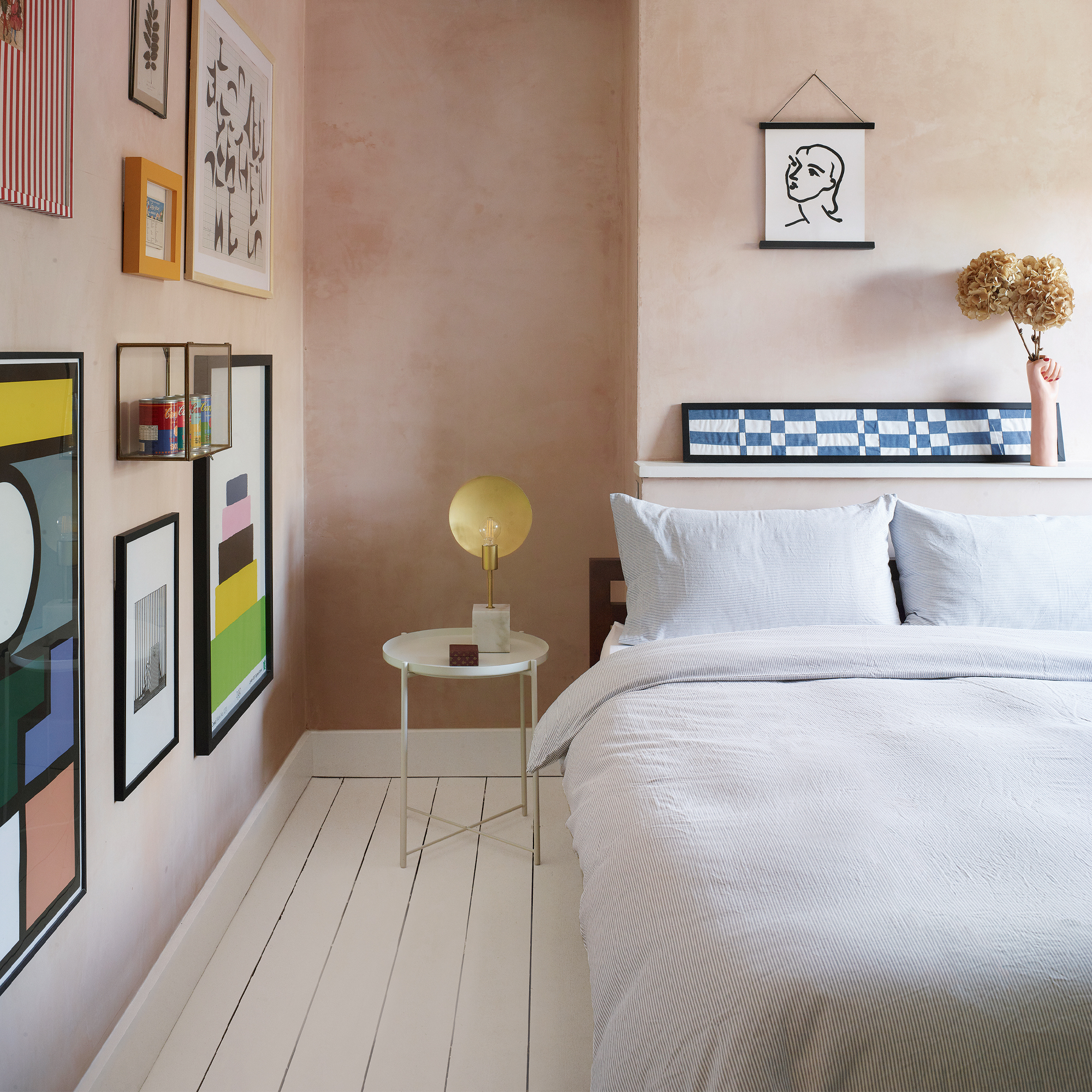
If you're looking to really make an impact with your paint choice try using bold paint effects, which can add depth to any colour scheme, even neutral bedroom ideas. By carefully mixing two colours, such as two neutrals, from the same colour strip you can create a textured effect for your walls.
This skillful painting method is a great way to make a statement without having to use pattern or shouty saturated colours.
25. Make a feature of a picture rail
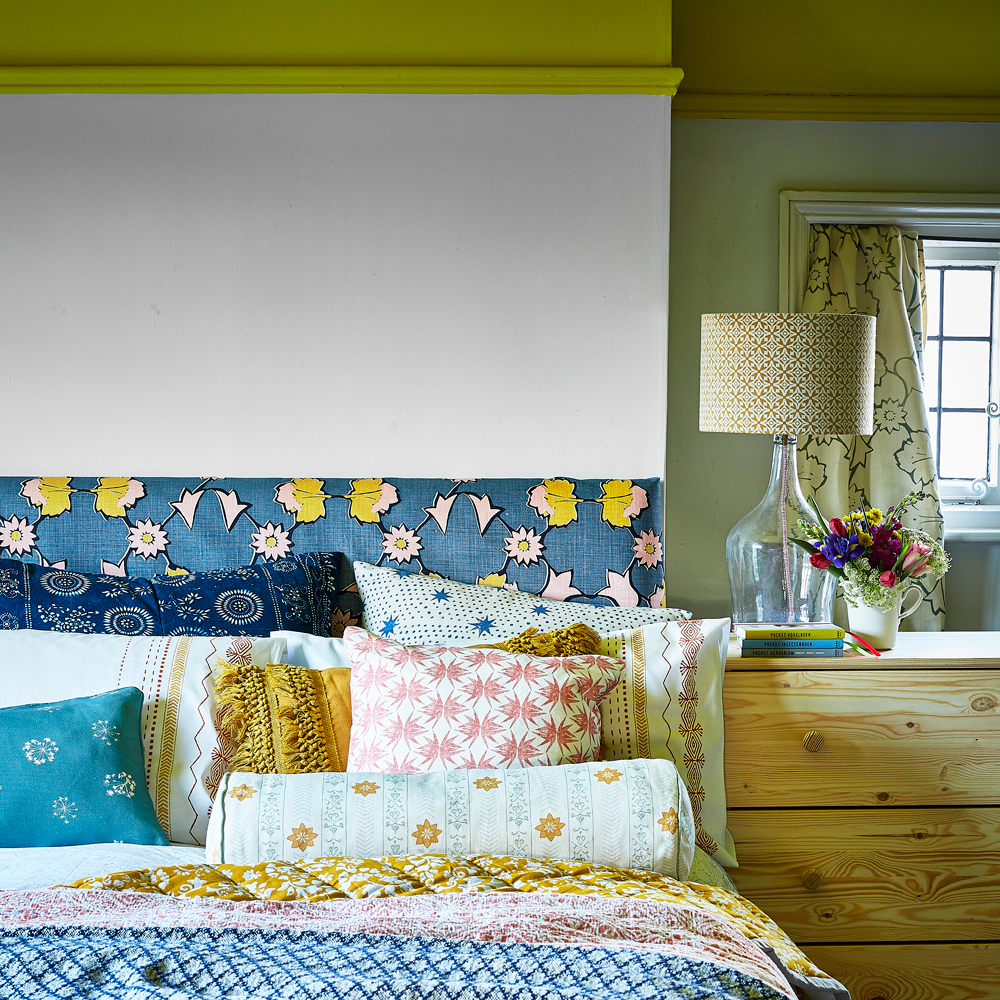
Create the illusion of ceiling height by painting above a picture rail. This simple, yet clever splash of colour helps to draw the eye up, stretching the walls up. It works best with bare walls, rather than decorated with bedroom wallpaper ideas and pictures. Choose a bright colour to make even more of a statement.
26. Go deep blue for a cosy, moody look
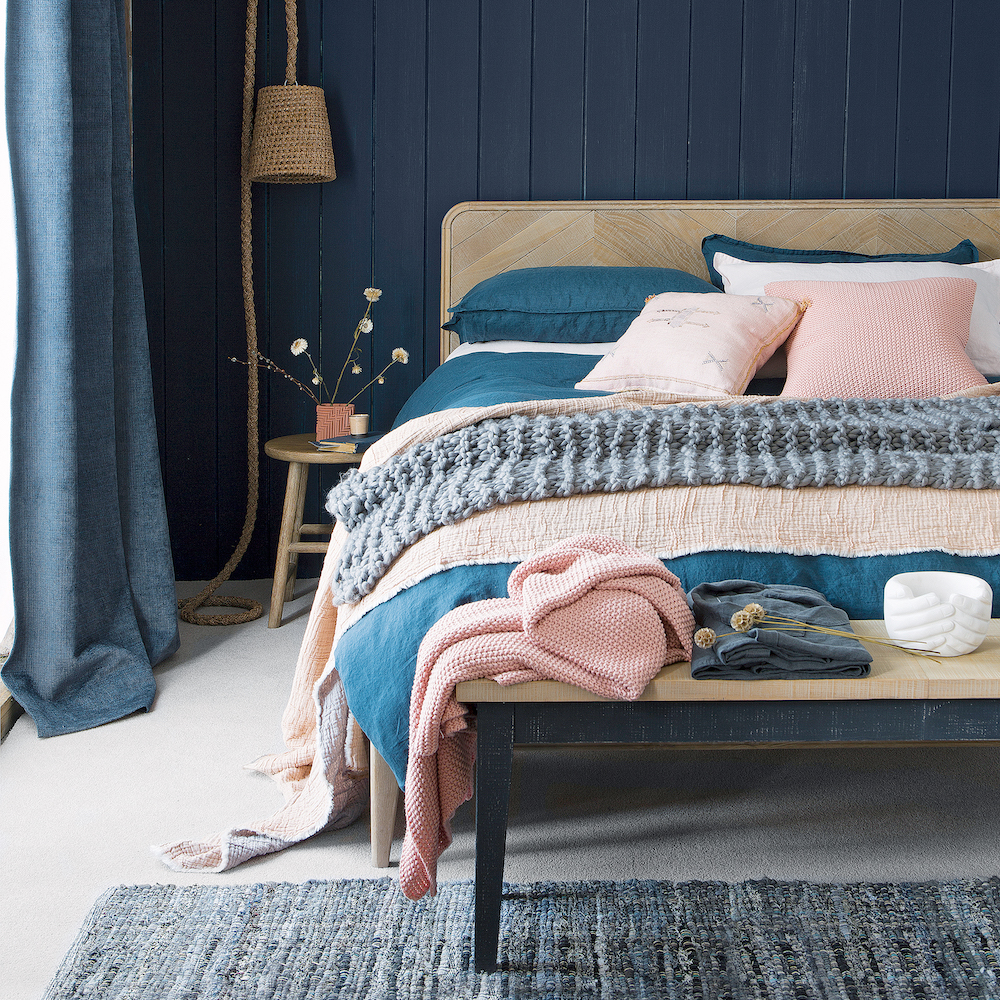
Struggling to sleep? Get yourself a couple of pots of deep blue paint pronto. Using dark inky shades to create a navy bedroom idea will help you switch off after a long day in front of a computer screen – just make sure you banish your devices, too.
When using such a deep blue it's important to break it up with pale wooden furniture and lighter linens so that the room appears cosy and cocooning – rather than bleak and oppressive.
27. Paint the coving to match the walls
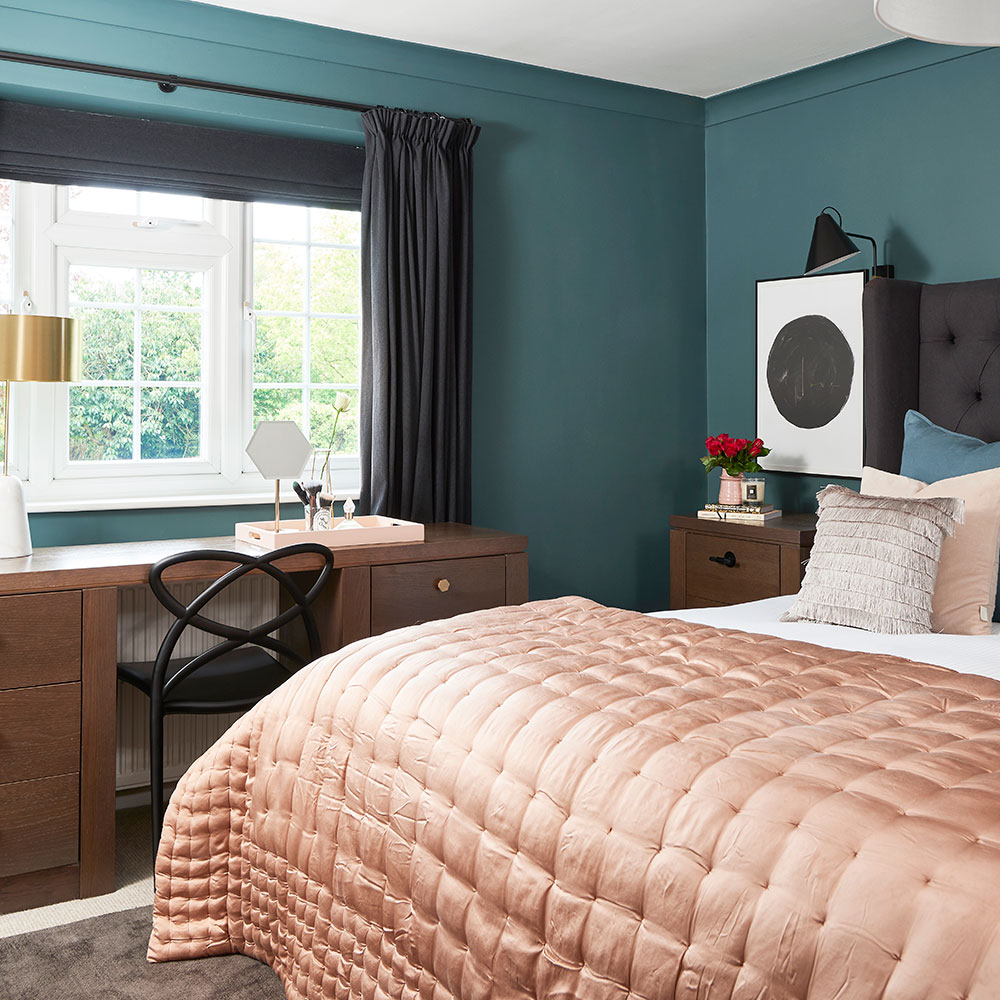
Carrying a colour up the wall and onto the architrave makes the ceiling feel higher and a room feel grander. It's a clever trick, particularly if you live in a house built in the 1980s or 1990s, where ceilings could be particularly low.
If you're looking for a colour that will work with dark wooden bedroom furniture, a deep blue or green is ideal. Teal bedroom ideas have the effect of making the wood seem less 'heavy' and old-fashioned, which it might against a lighter grey or white, but still allows the furniture to pop.
28. Match curtains and walls in refreshing green
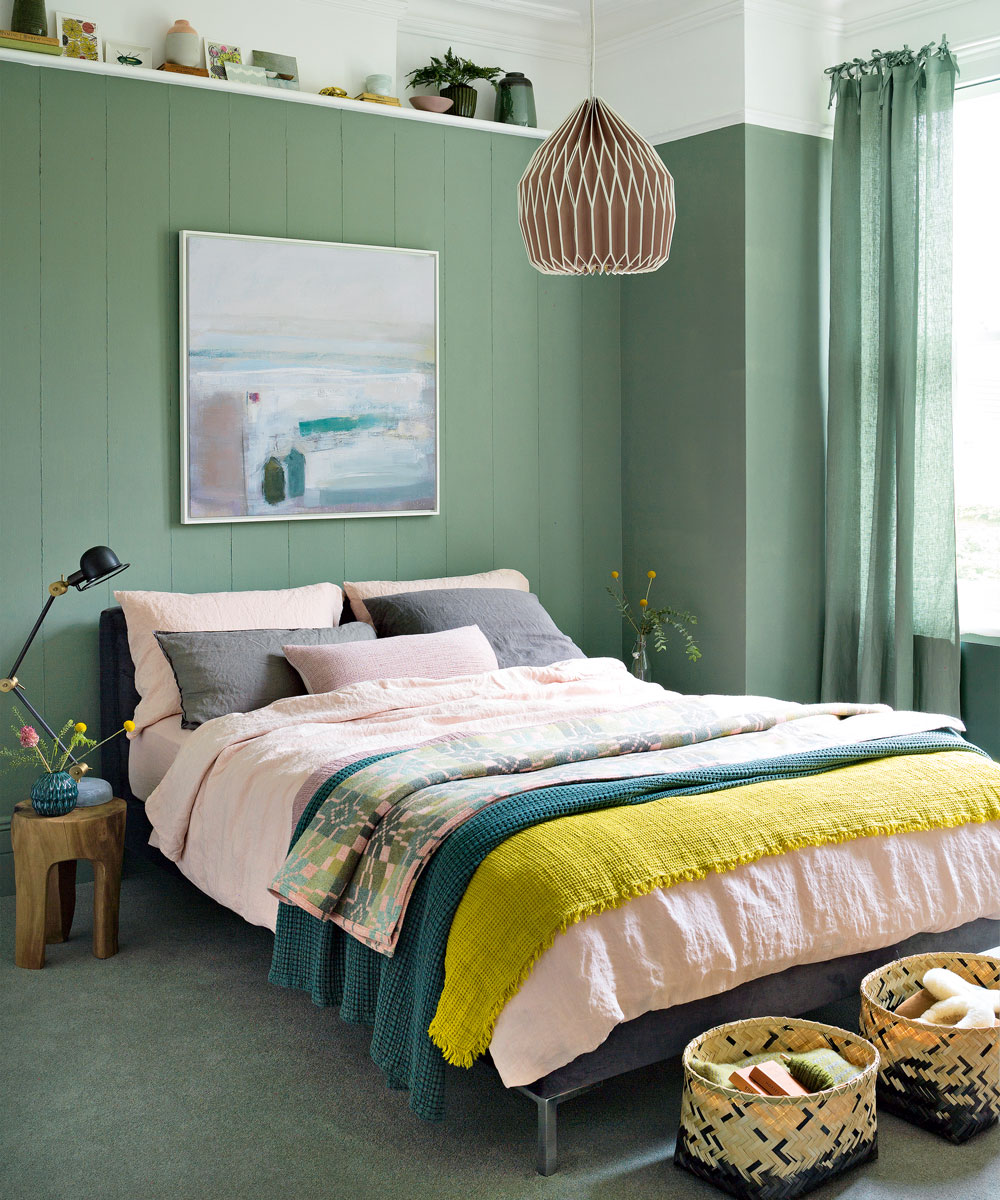
According to research, green is the best colour to paint a bedroom (a good plan if aiming to avoid the colour not to paint a bedroom). A green shade along the lines of this soothing mint is perfect. Enhance the impact as a backdrop by choosing curtains in exactly the same colour.
That way, you'll have less of a headache when picking bedlinen as you'll only have one colour that blankets and cushions will need to coordinate with, and a freedom to experiment with pattern. Green bedroom ideas are sure to make for a serene sleep space.
29. Create a pink plaster effect
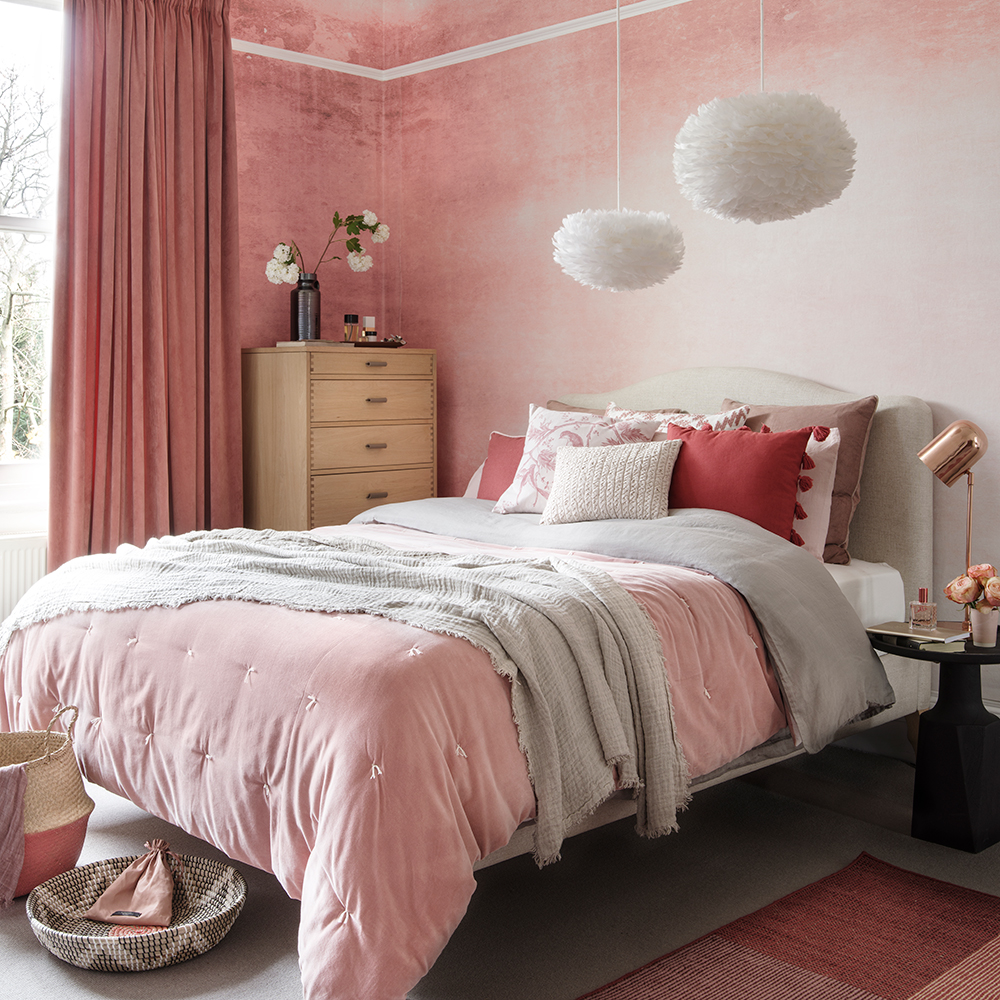
Back in the 1990s, paint effects were the height of sophistication when it came to how to paint a wall. They featured in pretty much every episode of the original Changing Rooms, with plenty of us attempting to recreate the looks (not always so successfully) at home.
Then the Noughties arrived and our sponges and Fleur de Lis stencils were relegated to the loft. but could they be making a comeback? Maybe not the stencilling just yet, but a sponge is just what you need to create on-trend plaster effect or Ombre. Start with a base of pinkish white, then slowly build patches of blush pink and coral, going dark to light across the wall. Or you could cheat and use a wallpaper mural!
30. Save on wallpaper by painting the bottom of the wall
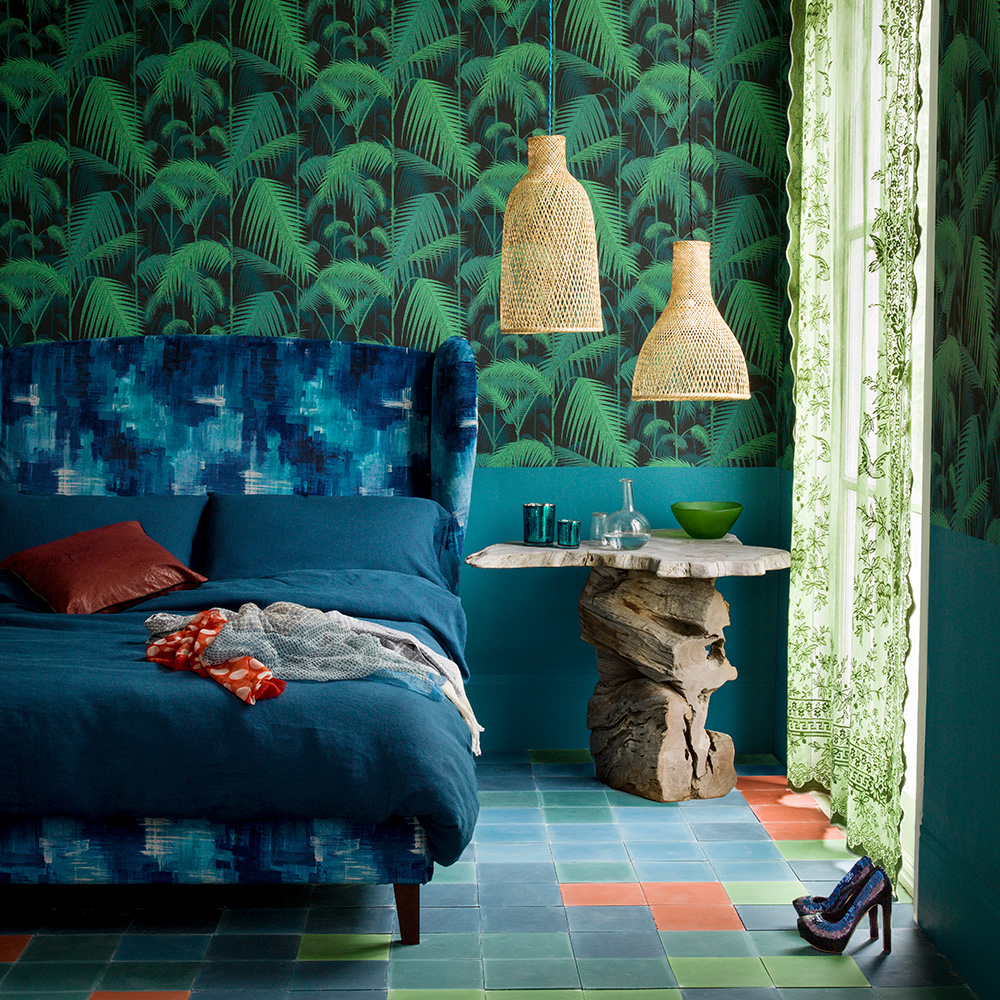
We love a feature wallpaper here at Ideal Home. But we appreciate that they can be expensive. If you're looking to cut the cost but don't want to be restricted to a single feature wall, try this neat trick instead.
Choose your print, then find a paint that either matches the backdrop or coordinates with the pattern – the teal used here falls into the latter category. Then paint the bottom third of the wall in that colour and paper the top two thirds. You should save one or two rolls' worth!
31. Use paint to zone your bedroom
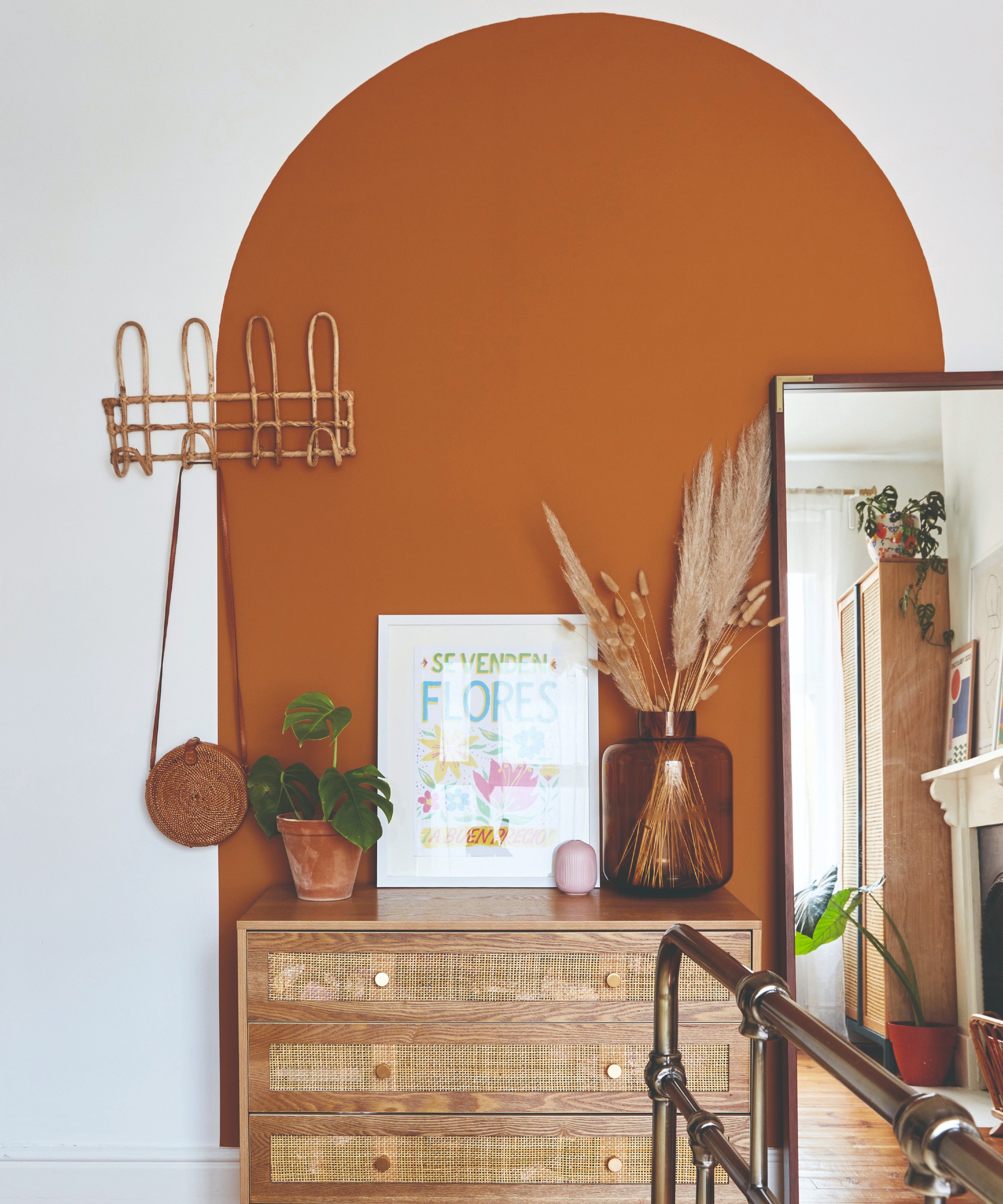
Paint is also a great way to create zones or section off an area of a room. Here, olive green demarcates a dressing and study area, whereas the area behind the bed has been decorated with a paler wallpaper. This attic room is flooded with light from floor-to-celiling windows, so it can take such a dark colour.
FAQs
What is the happiest colour for a bedroom?
'The concept of the "happiest colour" for a bedroom can vary from person to person, as individual preferences and cultural backgrounds play a significant role in determining what colours bring happiness and comfort,' says Jo Plismy, founder of Gong.
'That being said, some colours are considered to have mood-enhancing qualities. Green is one such example as is it commonly associated with nature and growth, and lighter shades can evoke a sense of freshness and renewal.'
Which paint finish is best for a bedroom?
As for the best paint finish for your walls, matt paint is perfect for the bedroom. A flat matt paint is often chosen for bedrooms, over areas like hallways or living rooms, as a bedroom wall rarely needs to be heavily cleaned.
Flat paint finishes such as a matt emulsion are less reflective than those with a sheen, such as silk or eggshell, and so the colour will look stronger and truer and it's also great at hiding any imperfections or textures on wall surfaces. Due to a flat paint colour reflecting less light, it will also have a more calming and soothing effect within the room.
What are the best colours to paint a bedroom?
According to Justyna Korczynska, colour consultant at Crown, 'there are many well-known theories surrounding colour psychology and how colours can evoke physical and psychological responses. When decorating the bedroom, it's important to choose a colour that resonates with you. Consider how a colour makes you feel, if it would help you unwind, or alternatively help you wake-up in the morning. Cool colours from nature such as blue and green tend to be restful, whereas warmer colours like yellow and orange tend to be more stimulating.'
So it's important to choose colours that appeal to your taste but also create a scheme that will be conducive to sleep. Colours that have been proven to reduce stress and soothe the nervous system are blues, greens, yellow, orange and pink. Try to stick with neutral or pastel shades for a calm, welcoming atmosphere.
Which bedroom idea are you diving into head first?
Tamara was Ideal Home's Digital Editor before joining the Woman & Home team in 2022. She has spent the last 15 years working with the style teams at Country Homes & Interiors and Ideal Home, both now at Future PLC. It’s with these award wining interiors teams that she's honed her skills and passion for shopping, styling and writing. Tamara is always ahead of the curve when it comes to interiors trends – and is great at seeking out designer dupes on the high street.
- Sara HesikovaContent Editor
- Nicky PhillipsContributor
